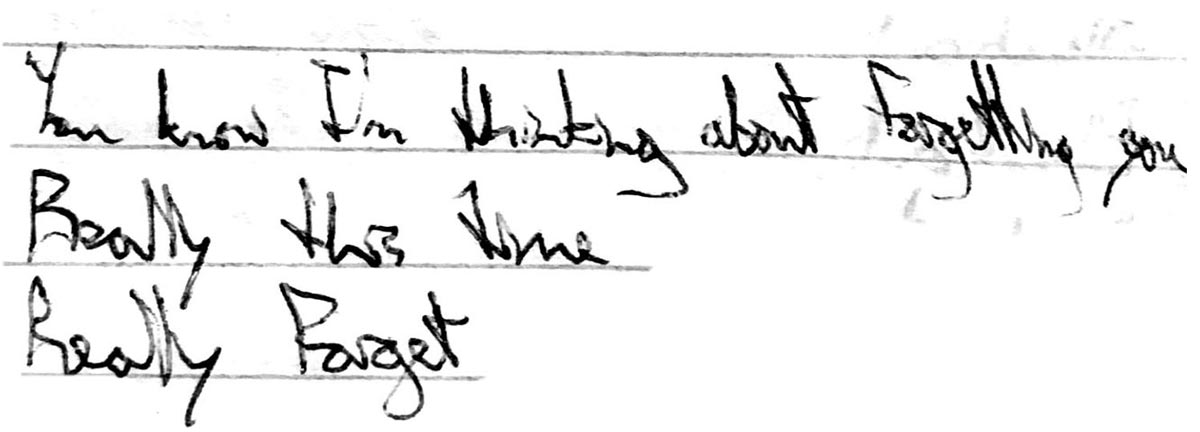The Best TV Shows of 2022 With LGBTQ Women and Non-Binary Characters
It’s difficult to summon any general or specific description of the LGBTQ+ television landscape in 2022 without feeling a nagging anxiety similar to one you might feel describing your bright future with a girl who might not even like you back — because if we learned anything about LGBTQ+ inclusive programming this year, it’s that we can’t really count on any of it to last. Of the 28 shows on this list, nine were cancelled and four have yet to be renewed. One of those cancelled shows, Minx, was renewed for a second season and already in production when HBO Max changed their minds, axed it, and announced its intention to remove its first season from the streaming service altogether. Only 11 titles on this list — 40% of the total — have been definitively renewed for additional seasons. (That said, we’re obviously more likely to vote hard for a show we’ll never have a chance to vote for again, so these lists do favor expired properties.)
That aside, it was another promising year for queer representation, including two of the year’s most notable LGBTQ+-focused shows that are both, in a way, period pieces, although set in two very different periods — A League of Their Own and High School. While we bid a sad farewell to Genera+ion, we got two new (and renewed) mostly-queer teen ensemble shows — Heartbreak High and Heartstopper. I’m always especially drawn to shows that don’t just show queer characters, but queer community, and 2022 delivered a second season of Bilal Baig and Fab Filippo’s Sort Of (which miraculously received its third season renewal), Peacock’s Queer as Folk reboot and of course, The L Word Generation Q. It was also a great year for “shows we were watching anyhow introducing sapphic storylines,” like The Only Murders in the Building, Search Party, Acapulco and White Lotus.
Last year the number of non-binary characters on television effectively quadrupled overnight, and that rapid increase continued in 2022 with new non-binary characters introduced on shows like Grey’s Anatomy, Queer as Folk, Heartbreak High, One of Us is Lying, The Sandman, Never Have I Ever, Quantum Leap, Chucky, Supernatural Academy, Our Flag Means Death and TLWGQ. Trans men, however, continue to be underrepresented onscreen, although we got a few new characters this year on Pretty Little Liars: Original Sin, Dead End: Paranormal Park and Tom Swift as well as seeing Elliot Page’s character on The Umbrella Academy come out as a trans man.
The overall number of queer women and/or trans characters on TV in 2022 is similar to what we saw in 2021.
But amongst all of the shows that dared to tell our stories, whomst amongst them was the best? Well, today I’ll present to you what our team decided upon, using a scientific private voting process involving the ten members of the Autostraddle TV Team: me (Riese Bernard), Heather Hogan, Carmen Phillips, Kayla Kumari Upadhyaya, Natalie Duggins, Valerie Anne, Drew Burnett , Shelli Nicole, A.Tony Jerome and Nic.
28. Gentleman Jack
HBO // Season Two
Cancelled
Last Year: Didn’t air

Photograph by Aimee Spinks/HBO
“Gentleman Jack’s success is due to showrunner Sally Wainwright’s complete refusal to flatten the portrayal of real life Anne Lister. Anne’s bravery, living louder and prouder than any known lesbian in history during the 1800s, is the stuff of legend. And it should be! But Anne Lister was also a complicated woman who was very invested in upholding the systems of power the working class were revolting against during her lifetime. Her relationship with her wife, Ann Walker, was no less layered. She loved her very much, but she also loved the opportunities that Ann’s wealth brought with her. They bickered. They stomped out on each other. And they also kept falling back into each other’s arms because something about their connection just wouldn’t let either of them quit. Gentleman Jack got all that right, and it was a joy to behold.” — Heather Hogan
27. Dead To Me
Netflix // Season Three
Cancelled
Last Year: Didn’t air

© 2022 Netflix, Inc
“Dead to Me came to a poignant close this year, thus ending the story of Judy and Jen, a queer woman and her straight best friend. Brilliantly acted by Linda Cardellini and Christina Applegate, it was a delight to watch these two characters go from unlikely friends to platonic life partners. They went through hell, but they went through it together. This show was as funny as it was emotional; especially in this last season, I feel like I teared up as often as I laughed out loud. And it was a special delight to watch Judy get flustered by, flirt with, date, break up with, and make up with Natalie Morales’ Michelle along the way.” — Valerie Anne
26. White Lotus
HBO // Season Two
Renewed for Season 3
Last Year: Didn’t have queer women characters
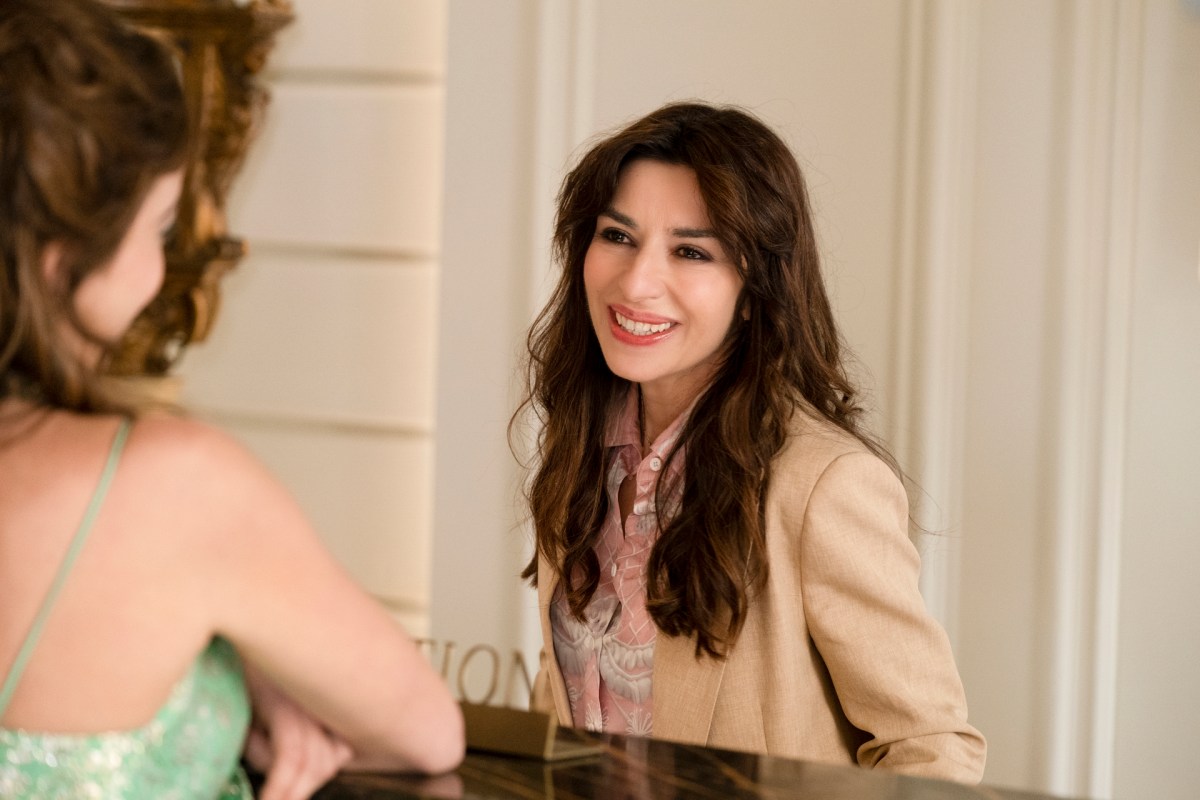
Photograph by Fabio Lovino/HBO
“The more-or-less settled-upon belief that Season Two of Mike White’s delectably weird whodunit is better than the first is correct, but especially so for our own selfish purposes: while Season One’s vaguely lesbian mean teens failed to deliver anything less vague, Season Two’s resort manager, the alternately meddling and anxious Valentina, was an actual lesbian who eventually had actual lesbian sex. We were tuning in, anyhow: for bisexual queen Aubrey Plaza as the skeptical and standoffish wife of a newly rich tech millionaire Harper (who did report having partaken in a threesome during her halcyon days) but also for a delicious mystery set amid a perpetually unsatisfied group of wealthy couples and families vacationing against a gorgeous Sicilian sky. White Lotus was appointment television, as fun to watch as it was to dissect between episodes, on TikTok and group chats and Reddit, where we trusted the story’s intentional choices were leading us towards a cliff-scaling twist. Sumptuous and satirical and always a whole lot of fun, White Lotus is rich in all the ways.” — Riese
25. Stranger Things
Netflix // Season Four
Renewed for Season 5
Last Year: Didn’t air

Tina Rowden/Netflix © 2022
“Stranger Things Part One: Season Four premiered earlier this year and was, unsurprisingly, broke the record for most views of an English-language premiere on Netflix. Our resident gays, Robin Buckley and Will Byers, are back to battle some terrifying evils and hopefully not get their hearts broken along the way. And, well, at least one of them succeeds. I’ve been extremely surprised that between the two, Robin has gotten more support from her best friend than Will. You remember Will? Who, you know, in season 2, came back to find his friends were like, “Man, you gotta stop acting like a kid.” as if he didn’t lose his childhood to being stuck in another dimension that was trying to kill him?
Yeah, that one. His story doesn’t get any better, it gets even more devastating, as he tries to confess his love (not overtly, but in a way that we all can understand as viewers) to one of his best friends. He’s met with about 10% of the support that Robin got from Steve and the consistent placing him literally in between Mike and Eleven to show what he’ll never have is lowkey brutal. But the shining light that is Robin Buckley, who Alex Masse beautifully explains is the autistic lesbian we are all waiting for, gives us at least one hopeful gay story. Our girl stutters through the overwhelming crush, broken heart, gets the girl in the end stage and it is wonderful to see her, very straight guy friend, support her wholeheartedly along the way. This is also where I’m gonna say that Robin and Nancy should be together, so you should watch so you can get on this shipping train with me.” — A.Tony Jerome
24. Derry Girls
Netflix // Season Three (Final Season)
Last Year: Didn’t air

“Derry Girls is just one of those shows. A moment in time about a moment in time that sticks with you forever. Creator and showrunner Lisa McGee pulled off one of the trickiest pieces of TV magic making the show about her own upbringing during the Troubles in Northern Ireland: She grounded the series firmly in late 90s, while sprinkling in a modern sensibility. It was Clare Devlin who embodied that last thing the most, our wee lesbian who came out in Catholic high school and even got a date and kiss with a girl in the show’s final season. Derry Girls never shied away from the hard stuff — political turmoil, religious persecution, loss and grief — but it also never stopped delivering the kind of jokes that make audiences all over the world belly laugh together.” — Heather Hogan
23. The Sex Lives of College Girls
HBO Max // Season Two
Renewed for Season 3
Last Year: Didn’t rank

Photo: Isabella Vosmikova
“Last season on The Sex Lives of College Girls, when a heartbroken Leighton Murray came out to her suitemate, Kimberly, she laments, “I don’t want to be like this. Kimberly, it’s terrifying. I don’t want my whole life to change.” But Kimberly’s there — the world’s greatest ally with her Pride balloon bouquet — and coming out’s just a little less terrifying. Then Leighton tells Bela and Whitney, the other members of this unwittingly chosen family, and the fear recedes. After that, whatever fear remains gets lost in the sheets of whatever queer or questioning girl Leighton beds during her post-coming out hoe phase.
But the resistance to changing her life? The resistance to being anyone other than the person she’s always seen herself as? That persists for Leighton throughout TSLOCG‘s second season. Her arc is the second season highlight.” — Natalie
22. First Kill
Netflix // Season One
Cancelled

Brian Douglas/Netflix © 2022
“First Kill had us in a chokehold from the second it was announced. Based on V.E. Schwab’s short story, the supernatural teen drama follows16-year-old vampire Juliette Fairmont, who needs to make her first kill to enter into vampire adulthood. She’s struggling with the whole murder thing when she meets and falls for Calliope Burns, who hails from a family of monster hunters. It’s lesbian Romeo and Juliet, but sexier and bloodier. Plus, First Kill gives us two very Mommi mommies to supplementally enjoy. Unfortunately, First Kill was the first show Netflix axed in its 2022 LGBTQ Bloodbath.” — Heather Hogan
21. Search Party
HBO Max // Season Five (Final Season)
Last Year: #22
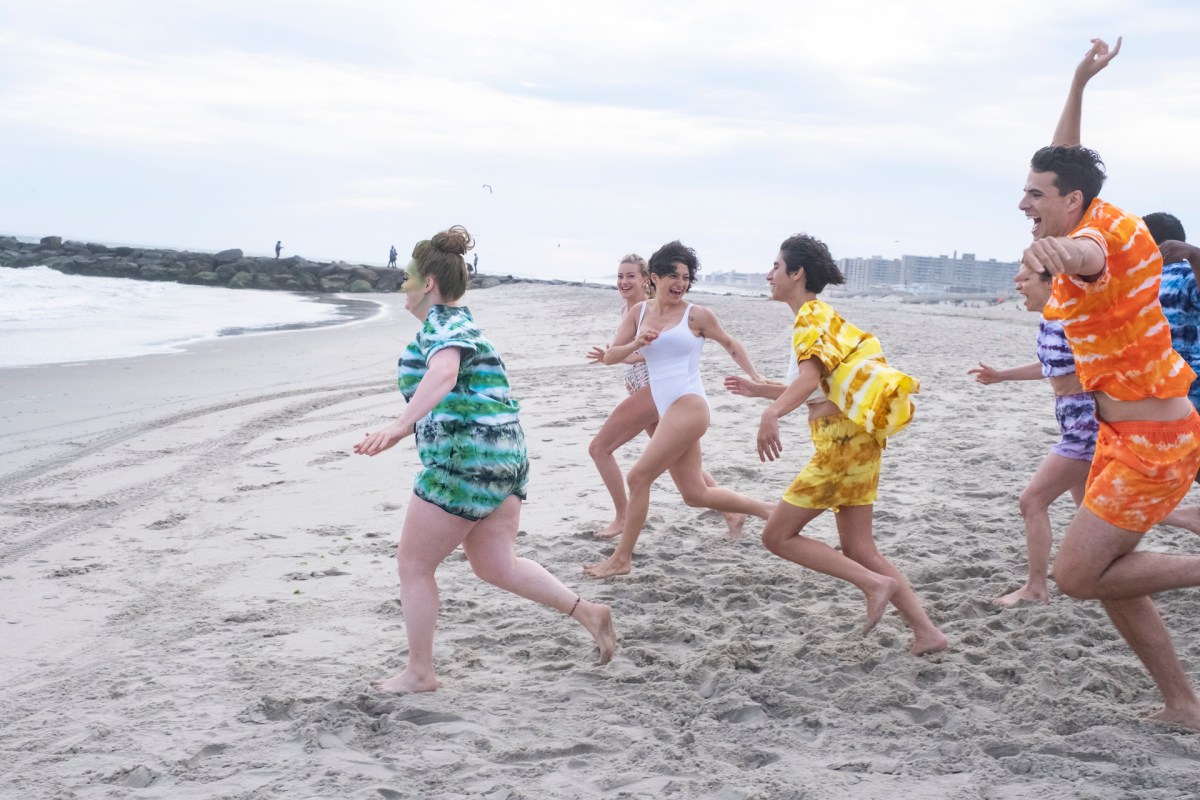
Photograph by Jon Pack/ HBO Max
“Queer is a genre as well as an adjective. Sure, there are TV shows that are queer because they have a queer character or several, but not all of those shows have a queer sensibility. There is queer TV and then there is Queer TV. Search Party is Queer TV. Its first season could be dismissed as Girls with mystery elements, but anyone who had seen show creators Charles Rogers and Sarah-Violet Bliss’ acerbic feature Fort Tilden knew they were getting at something deeper. Each season that depth and specificity has been clarified, especially when the show moved from TBS to HBO Max. This final season was not only its gayest — at least in the traditional sense — it also was the rare chance to see an audacious work of Queer Art end on its own terms. Search Party is one of the great success stories of the 2010s streaming boom. What started as an easy-to-love pitch evolved into a show where Susan Sarandon is Cole Escola’s grandmother and a literal zombie apocalypse breaks out. Conversations about representation have grown stale — this is the kind of singular work we should be fighting to see.” — Drew Burnett Gregory
20. Better Things
FX // Season Five (Final Season)
Last Year: Didn’t air
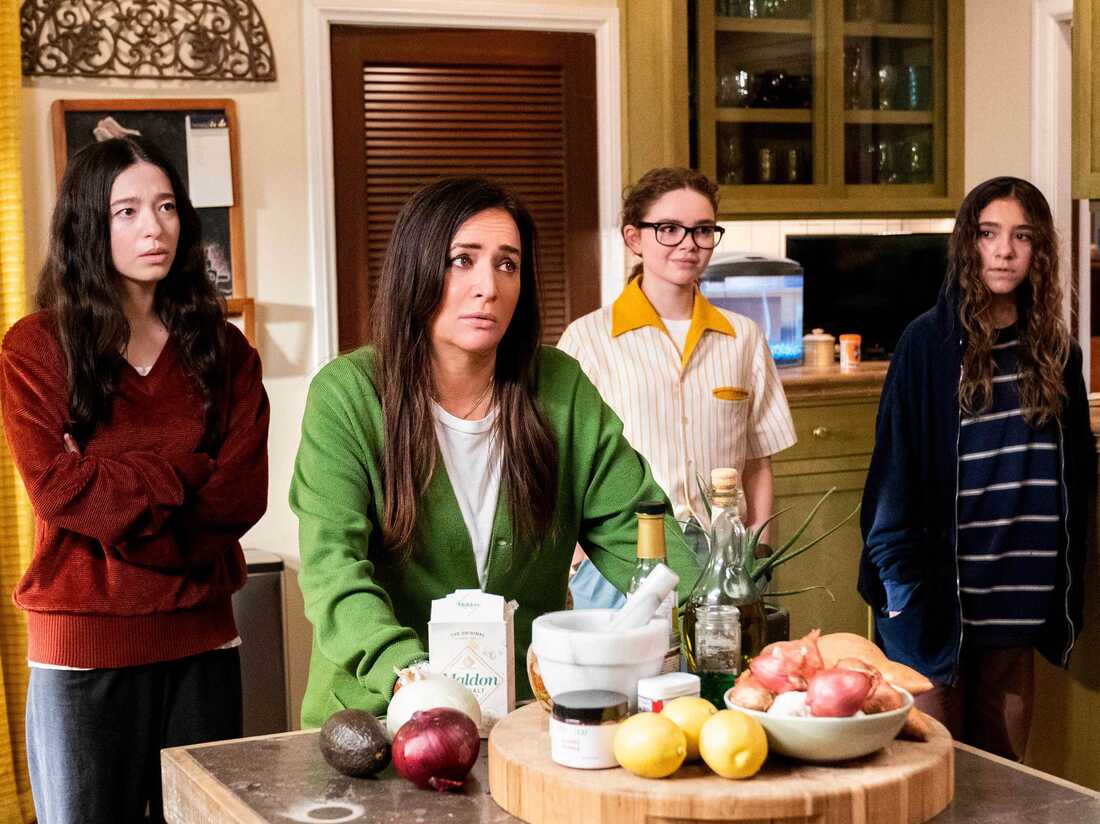
Suzanne Tenner/FX
“I hate to start a blurb about one of the most comforting comedies of the last decade by bringing up the bigotry toward trans youth that has swept the country in recent years. But when so many New York Times op-eds are fixated on a moral panic, it’s important to have a counter-example. Pamela Adlon’s Sam Fox was that counter-example. Her middle child, Frankie, never lands on a gender or a sexual orientation during the run of the show. They don’t have to. The love and support Sam provides is unconditional. That doesn’t mean she does everything right but she tries and that trying is everything. She lets her kid explore, she lets her kid be whoever they are in that moment. She respects her kid’s identity.
And then respects her kid’s identity again when it changes. This is just one aspect of Better Things but it’s indicative of the show’s overall approach to family and community. It’s corny to say that any work of art has a core message of love but when I say that about this show, I mean it in a way that goes beyond platitudes. It’s love of cooking, love of travel, love of work, love of friends, love of children, love of parents, love when loving feels impossible, loving when you don’t understand, loving when you’re tired, loving when you’re angry, loving even when you’re hating too. In the series finale, Sam’s youngest tells her, “I like the way you live your life.” Ultimately, that’s what this intimate, little show managed to accomplish: a guide to a loving life.” — Drew Burnett Gregory
19. Bad Sisters
Apple+ TV // Limited Series

“This series is a MASTERPIECE in television and I say that proudly and firmly. There are five sisters, including one eyed le$bian with an amazing home Bibi, and four of them hate the fifth sisters husband perfectly known as ‘The Prick.’ Throughout the series every episode helps to unravel exactly why each sister has an issue with him — and also shows their attempts at murdering him. I know we each have a family member we just cannot stand, but this series shows what could happen if you decide you can’t take them to the point where they need to be gone. It’s funny, witty, wildly well-written, and the surprises that happen ACTUALLY surprised me and that finale — PHEW!!!!! I’m also going to go ahead and say that this series has one of the best opening credits I’ve seen in a minute.” — Shelli Nicole
18. Reboot
Hulu // Season One
Not yet renewed or cancelled

Photo by: Michael Desmond/Hulu
“There were so many ways for Reboot to go wrong. A real TV show about a rebooted fictional TV show about a classic fictional TV show. It’s too many moving parts to even wrap your head around. But by the time Reboot hit its stride in the middle of its eight-episode first season, all the myriad pieces were working together seamlessly. Is it a coincidence that the middle of the season is also when the series revealed that Hannah, Timberly, and Bree are all queer? (Lesbian, pansexual, and “a sexual fluid,” to be precise.) I think not! Reboot was a million jokes a minute, and it was also full of heart. As a bonus: Hannah joins the way too short list of Jewish lesbian characters.” — Heather Hogan
17. Minx
HBO Max // Season One
Cancelled
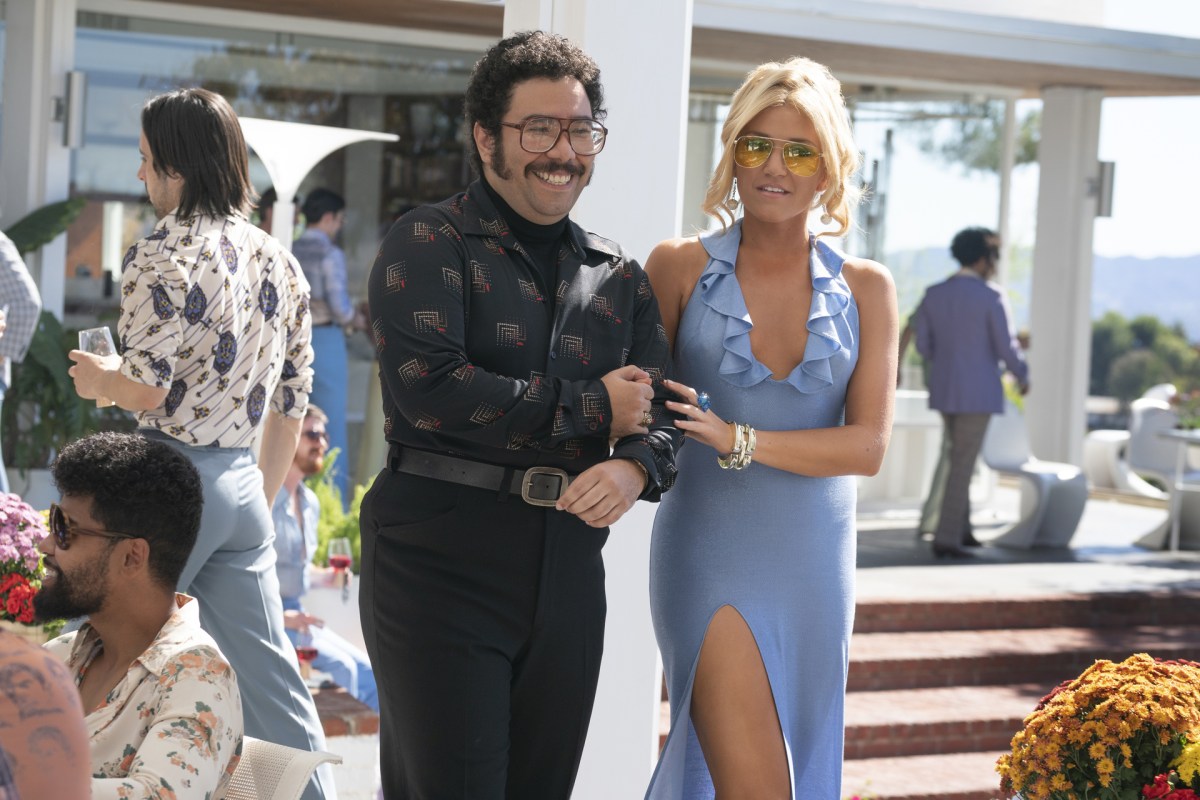
Photograph by Katrina Marcinowski / HBO Max
“Picture it, it’s 1970’s Cali and the porn industry (and polyester suits) are booming like mad. Joyce, a writer and feminist, wants to start a magazine, its been a dream of hers forever. She then ends up meeting Doug who helps her start a magazine — but it ends up being the first porno mag for women! It’s got hot guys, their cute butts, and incredible articles and all their photo spreads tell a story. It ends up being queer too when her older sister has a bit of a lesbian awakening of her own. But nudity and gayness aside, its a very dope show. It shows a side of the this era and the sexuality of it all from a women’s perspective (that isn’t Gloria Steinem), and its not trying to hit us too hard on the head with the point of it all. I’d also like to mention Idara Victor and Oscar Montoya who steal pretty much every scene they are in!” — Shelli Nicole
16. The Owl House
Disney Channel // Season Three
Cancelled
Last Year: Didn’t Rank

“What else can I say about The Owl House that I haven’t already squealed in raptures this year? I think I’ve covered it all! So let me just reiterate that I think Dana Terrace’s Disney Channel black sheep is doing LGBTQ+ representation as well — and better, in most cases — than any “grown-up” show on TV. It’s not just the quantity of gay and trans characters, though there are many. It’s the fact that their internal lives are so rich and on display; their adventures are so full of life and wonder; their relationships are so layered and lovely. Season three also went all in on exploring the deep connections and complicated dynamics in found families vs. natal families. Luz is maybe the only bisexual character I’ve ever seen who has found a true home with both.” — Heather Hogan
15. Heartbreak High
Netflix // Season One
Renewed for Season 2

ELISE LOCKWOOD/NETFLIX
“In addition to having varied and nuanced queer storytelling in its first season, Heartbreak High was one of the best depictions of a significant friendship breakup on television this year. The series managed to explore so many interpersonal and systemic social issues — from dating while autistic to policy brutality against Aboriginal peoples to bisexual awakenings to slut shaming to comprehensive sex education to class and mental health — but without ever feeling corny or moralizing about any of these things. Instead, it did so with humor and ample room for mess. The cast is charming and has great chemistry, and the love triangles are great teen drama fodder.” — Kayla Kumari Upadhyaya
14. Paper Girls
Prime Video // Season One
Cancelled
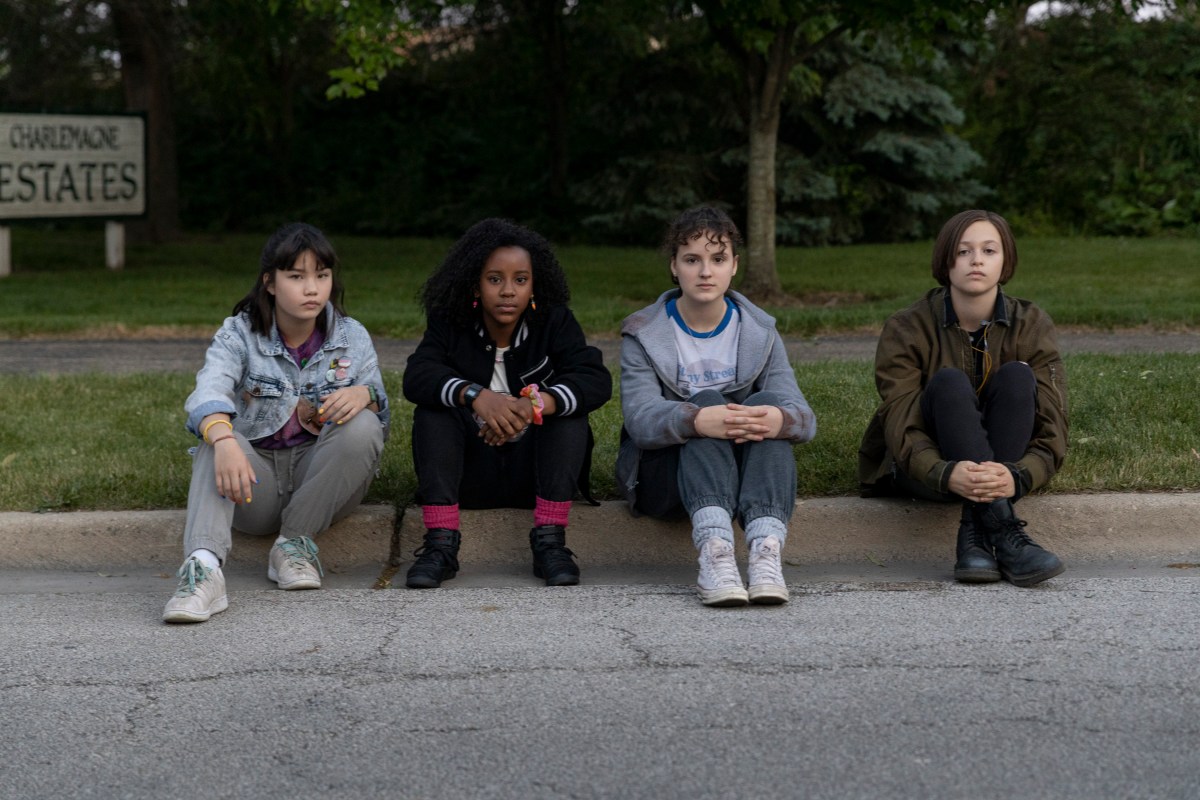
“Paper Girls is another show on this list that is gone too soon! I might get in trouble for saying it, but the Amazon adaptation of the best-selling graphic novels is everything I wanted Stranger Things to be. KJ’s arc, in particular, captivated us all — and I could just tell the series was gearing up for more! I think a lot about what Young Me would think if she met Now Me, and Paper Girls let me live out the fantasy of my closeted, insecure teenage self coming face to face with my happy, whole, loud and proud adult self. There’s so much to be said about healing your inner queer child. I wish Paper Girls had been given a real chance to share that story.” — Heather Hogan
13. Harley Quinn
HBO Max // Season Three
Renewed for Season 4
Last Year: Didn’t Air
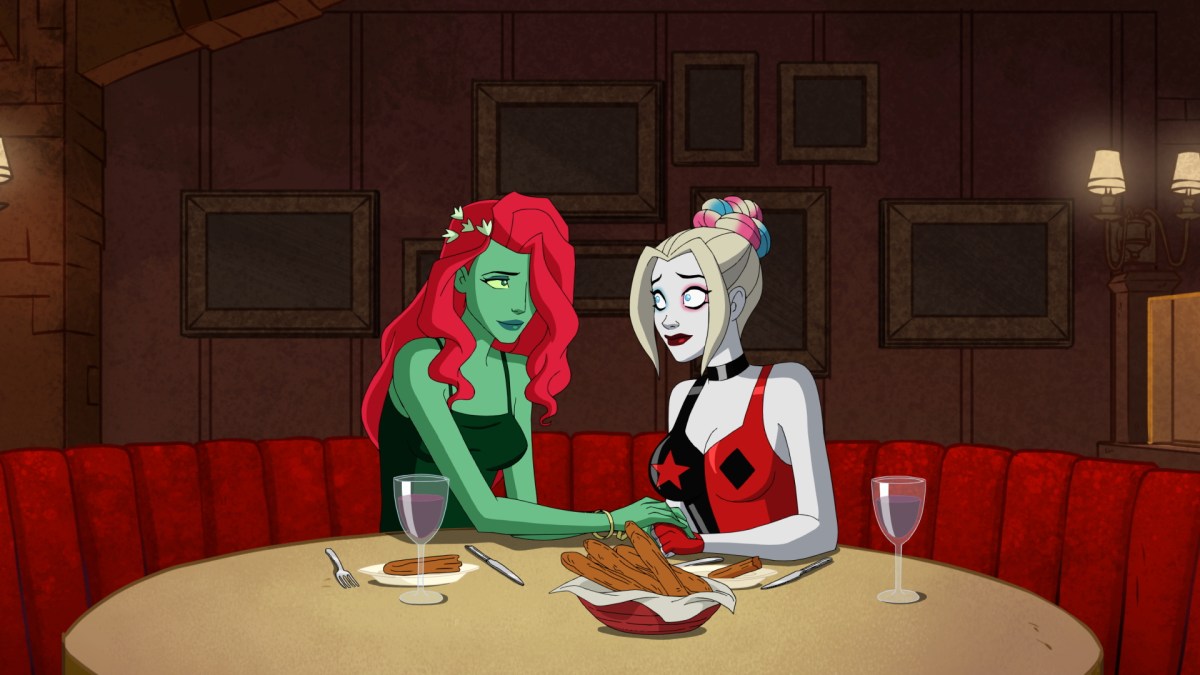
Photograph by Courtesy of HBO Max
“In its three seasons, Harley Quinn has never stopped surprising me. The way it called Joker on his abuse of Harley and let her murder him dead in the first season. The way it slow-burned Harley and Ivy from best friends to accidental lovers to girlfriends in the second season. And then, the way it let both characters, and their relationship, face challenges and grow stronger and better together in the third. Season three was as irreverent as ever — maybe more so, with Bruce Wayne’s plans to reclaim his childhood by making his very dead parents into zombies — but it was also shockingly soft in all the right ways.” — Heather Hogan
12. Heartstopper
Netflix // Season One
Renewed for Season 2

“Based on the beloved graphic novel of the same name, Heartstopper comes as close to capturing the feeling of a first gay crush as any TV show I’ve ever seen. The relationships are so sweet. The music is so queer and poppy. And there are just so many LGBTQ teens to root for. The standout for us was Yasmin Finney’s Elle, a trans girl who transfers from an all-boys school and finds herself fully accepted and loved into Heartstopper’s friend group. Heartstopper doesn’t exist to challenge straight viewers, but it does exist to comfort queer ones. And that’s more than we can say for every other show that’s been compared to Glee over the years!” — Heather Hogan
11. The L Word: Generation Q
Showtime // Season Three
Not yet renewed or cancelled

Troy Harvey/SHOWTIME.
“Season three is easily the strongest of Generation Q’s run. With the exception of Tibette’s dramatic reunion, the stories have dialed back the nostalgia a little bit and instead invested more time and energy in the new characters and relationships. Finally, it doesn’t feel like so much of a shadow of the show’s legacy looms over it and more like the series stands on its own. This is especially seen in this season’s Halloween episode, a playful and silly but ultimately grounded and layered episode that does bring back the past in the form of a guest appearance by Daniel Sea as Max but also plays by its own rules rather than the original’s. Shane even apologizes for the past. Generation Q also continues to be one of the only shows on television that shows the sex lives of queer women over 40 and 50, and for that alone, it still stands out in the queer television landscape.” — Kayla Kumari Upadhyaya
10. Station Eleven
HBO Max // Limited Series
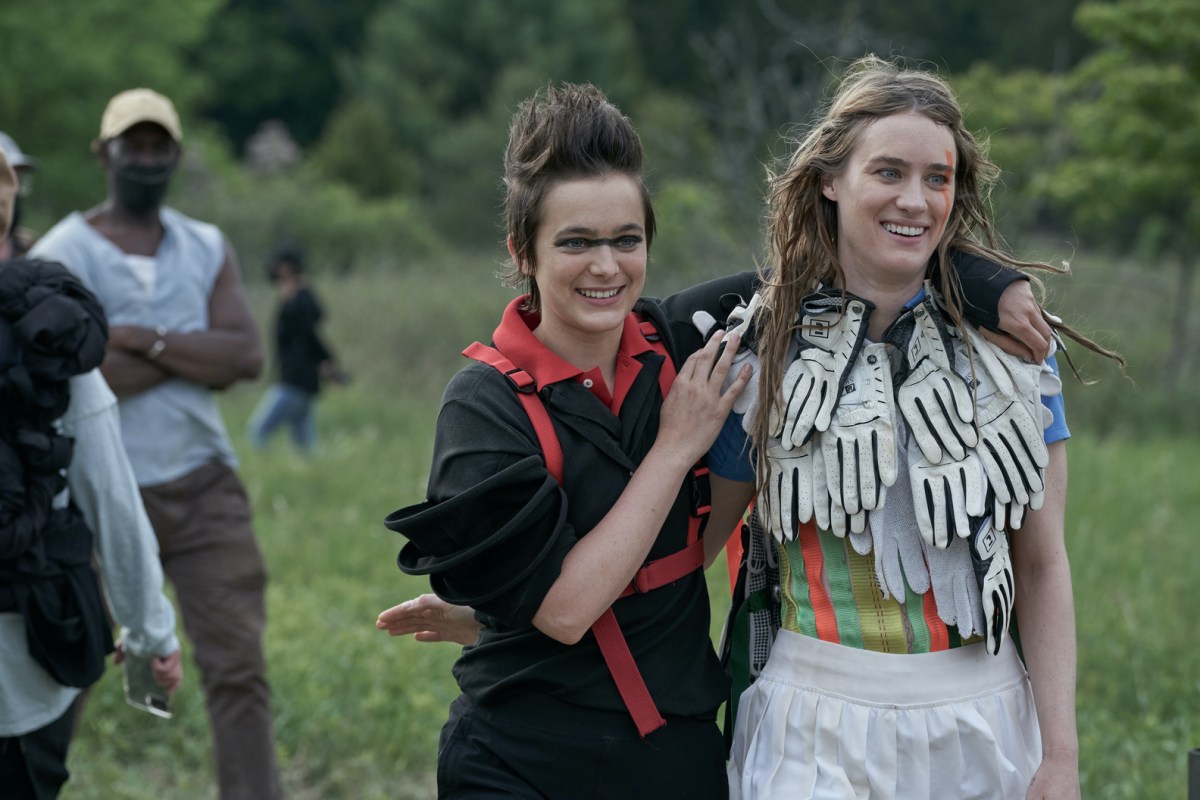
Photograph by Ian Watson/HBO Max
“When we talk about comfort shows we’re usually referring to a gay children’s cartoon or a queer ensemble with sexual chaos. We are not usually talking about an apocalyptic drama that is at times so unpleasant that after finishing the fourth episode while recovering from Covid, I needed to stop watching for several weeks. And yet, by its heartfelt conclusion that is exactly what Station Eleven became. It is an ambitious, layered story about a doomsday quicker than our own and the bisexual theatre kid who survives and grows up to be Mackenzie Davis. It’s also a tribute to the power of art amid our most trying times. Davis leads a remarkable cast with Himesh Patel and Danielle Deadwyler giving two of the best performances on TV this year. When times are tough, escapism is nice, but meaningful art that shows reality and then shows hope is even better. Station Eleven shows that in its story — it shows that in its very existence.” — Drew Burnett Gregory
9. Queer as Folk
Peacock // Season One
Cancelled
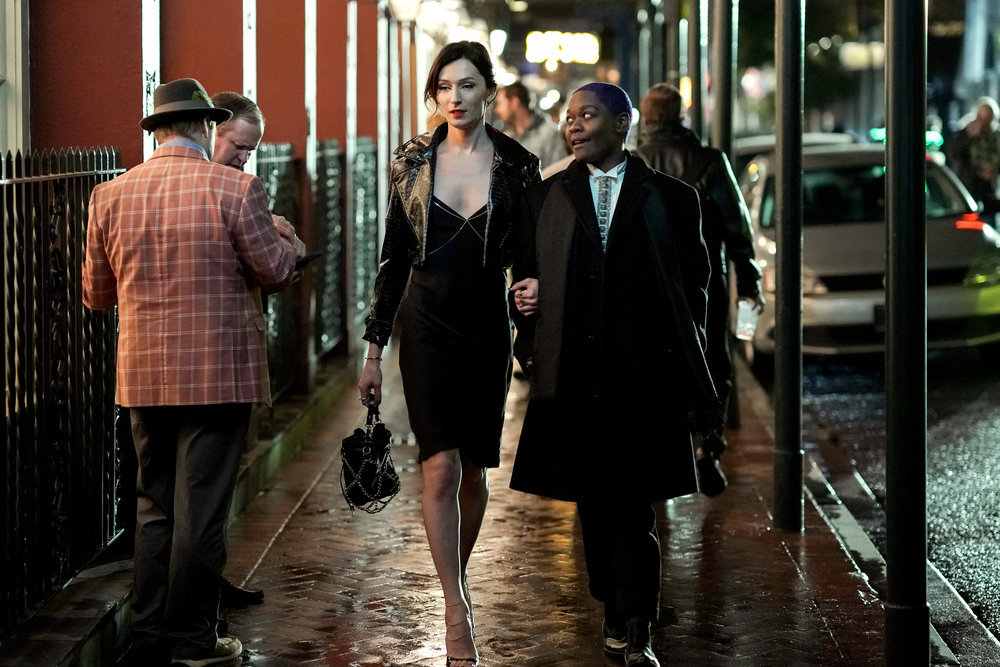
QUEER AS FOLK — Episode 104 — Pictured: (l-r) Jesse James Keitel as Ruthie, CG as Shar — (Photo by: Alyssa Moran/Peacock)
“I’m not sure how the swiftly cancelled Queer as Folk reboot will ultimately be remembered — but to me, I saw nothing but promise, a dynamic cast and a team that was willing to take risks and eager to break representational ground. Like another noted reboot of a beloved Showtime program about queer people, it faced a tough audience of those who loved the original and also those who hated it. Unlike the deeply white, cis and able-bodied original characters (mostly played by straight actors), all of the new QAF’s main characters were people of color or trans or disabled or all of the above. The original series’ token not-gay-guys were a white lesbian couple named Mel and Lindsay, and the reboot delivered us Char, a non-binary Black masculine-presenting person and their partner, Ruthie, a trans woman who’d grown up with the series’ star, gay party boy Brodie. Queer as Folk gave us groundbreaking and incredibly hot sex, a Craft-inspired drag show, a sex party catered towards people with disabilities and a joyful portrait of chosen family coming together in the face of shared trauma. There really is nothing that defines queer community quite like it’s historical dedication to Throwing Parties When We’re Sad.” — Riese
8. High School
Prime Video/Freevee // Season One
Not yet renewed or cancelled

“Clea DuVall and Laura Kittrell’s adaptation of Tegan and Sara’s teenage memoir makes for great TV, in large part because pop music’s favorite lesbian twins were so open when they wrote the book. The series has a glorious 90s sensibility. The flannel! The hair! The Doc Martens! The Nirvana of it all! And a Canadian one too. But there’s also something universal about the story of these two gay kids figuring out who they are in relation to their sexuality, their friendships, their dreams, and each other. Newcomer twins Railey and Seazynn Gilliland made an admirable leap from TikTok to TV, winning the hearts of longtime fans and even viewers who only knew Tegan and Sara from that Lego Movie song.” — Heather Hogan
7. Sort Of
HBO Max // Season Two
Renewed for Season 3
Last Year: #18

Photograph by Courtesy of HBO Max
“Towards the end of Sort Of‘s first season, Sabi (Bilal Baig) had, seemingly, found their footing. Their mother was coming to understand them, to acknowledge Sabi’s need to be themselves as she affirmed her own need. They’d enmeshed themselves in the lives of the Bauer family, becoming a trusted confidante for Paul, a comforting presence for his two children. But slowly, the foundation beneath Sabi’s feet shifts. Their father returns from Dubai. Bessy awakens from her coma. Relationships grow far more complicated and a refuge ceases to exist. It all sounds like too much but in its second season, Sort Of builds on the self-discovery from the first season and assures Sabi that they’re strong enough to handle whatever comes next.” — Natalie
6. Reservation Dogs
FX // Season Two
Renewed for Season 3
Last Year: #14

“I often say I like to read books that are not only queer in content but also queer in form. Reservation Dogs is one of the first television shows I’ve seen that this also applies to. This show feels queer in its DNA, in its refusal to adhere to strict structure or be defined by a single genre. You can tell there are multiple queer folks in the writers room, and sometimes it’s those behind-the-scenes presences that matter even more than surface-level on-screen representation. In its second season Reservation Dogs continued to push the boundaries of conventional televisual storytelling. The cast excels all the way down to minor characters, and the strong sense of place makes for immersive, memorable worldbuilding. It’s also a show that rewards rewatches, so detailed throughout.” — Kayla Kumari Upadhyaya
5. A Black Lady Sketch Show
HBO // Season Three
Renewed for Season 4
Last Year: #2

HBO
“I feel as if, at least at Autostraddle, A Black Lady Sketch Show has been claimed as queer culture for years. It felt refreshing, right from the top, to have such a smart, unabashedly Black, show also emphasize the point that all Black women — queer Black women, trans Black women — are funny as hell. But I’d argue that it wasn’t until this season when ABLSS really hit its exemplary, chaotic, peak. It’s no coincidence that their funniest season is also their gayest. Sweetly, casually gay, with queer characters as a part of a painted portrait of over-the-top caricatures where their sexuality was not the point or the punchline, but also as main characters in sketches where the jokes only landed if you knewto be in on them. Ashley Nicole Black trying to come out to her parents, only to be outshined by a spider terrifying everyone over the dinner table. Raven Symoné as a stud needing a bathroom. Wanda Sykes delivering stand up. Michaela Jaé Rodriguez as the self-centered clerk of a beauty supply store in a fantasy episode of The Purge. We were everywhere, and everywhere was a perfect place to be.” — Carmen Phillips
4. P-Valley
Starz // Season Two
Renewed for Season 3
Last Year: Didn’t air

“I may never have the words for P-Valley. Even now, my overwhelming feeling is stunned that we were lucky enough to witness it all? In P-Valley’s first season, Katori Hall wrote a Black queer nonbinary character in Uncle Clifford (Nicco Annan), owner of the Pynk strip club, that was breathtaking in its fullness. And yes, Uncle Clifford’s relationship with Lil Murda (J. Alphonse Nicholson) — a gay closeted rapper who’s head over heels in love with her, no matter how many walls Clifford puts up for what she believes is for both of their safety — has always been important. But it was the second season, and the exploration of Lil Murda on his own terms, and his relationship with a previous ex who was so much more, Big Teak, that broke me. I have never seen queer Black men taken with such care, such tenderness. John Clarence Stewart’s performance as Big Teak, in any other just world, would be an Emmy. And then there’s Mercedes (Brandee Evans), who, in trying to create a life for herself away from the club, finds self-discovery in Farrah. And there’s Farrah, after being repressed in her marriage for years, opening anew for Mercedes.
The best Black queer story told last year on television was P-Valley. The best and most realistic story about Blackness in the pandemic was P-Valley. And if there’s one show you missed and should watch, it’s absolutely down in the valley where the girls get naked. Don’t forget your bands, because ’round here we pay sex workers for their work.” — Carmen Phillips
3. Hacks
HBO Max // Season Two
Renewed for Season 3
Last Year: #5
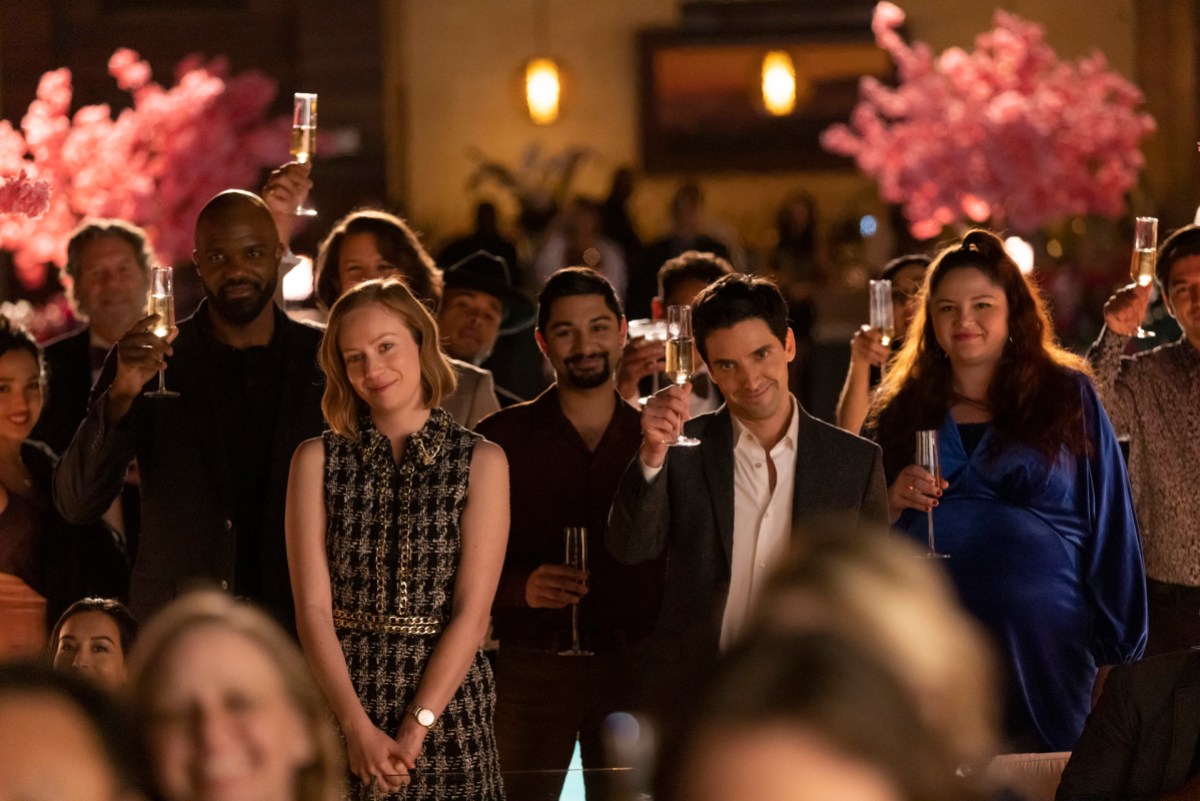
Photograph by Karen Ballard/HBO Max
I always worry about a sophomore slump when it comes to shows whose first seasons blow me away, and I certainly had my fears about Hacks managing to pull off its strange magic a second time in a row. But it not only matched its first season’s singular sense of humor but pushed things even further. It’s discomfort comedy at its finest. Hannah Einbinder and Jean Smart are the best dysfunctional duo on television. Season two is such an unflinching look at failure, especially late-in-career failure. Deborah Vance is floundering, but she also refuses to quit. You’re never too old to bomb.
For artists — with the exception of very few — you’re always hustling, no matter how much success you’ve amassed. It’s always fun to watch when Deborah and Ava when they’re in their element, but it’s even more interesting to see when they fuck up — not only in their personal lives but also in their careers. And their relationship to each other remains one of my favorite dynamics, full of venom and admiration all at once. They’re obsessed with each other on a toxic level, and it makes all their conflicts so explosive. And the lesbian cruise episode is hall of fame status.” — Kayla Kumari Upadhyaya
2. Batwoman
The CW // Season Three
Cancelled
Last Year: #16
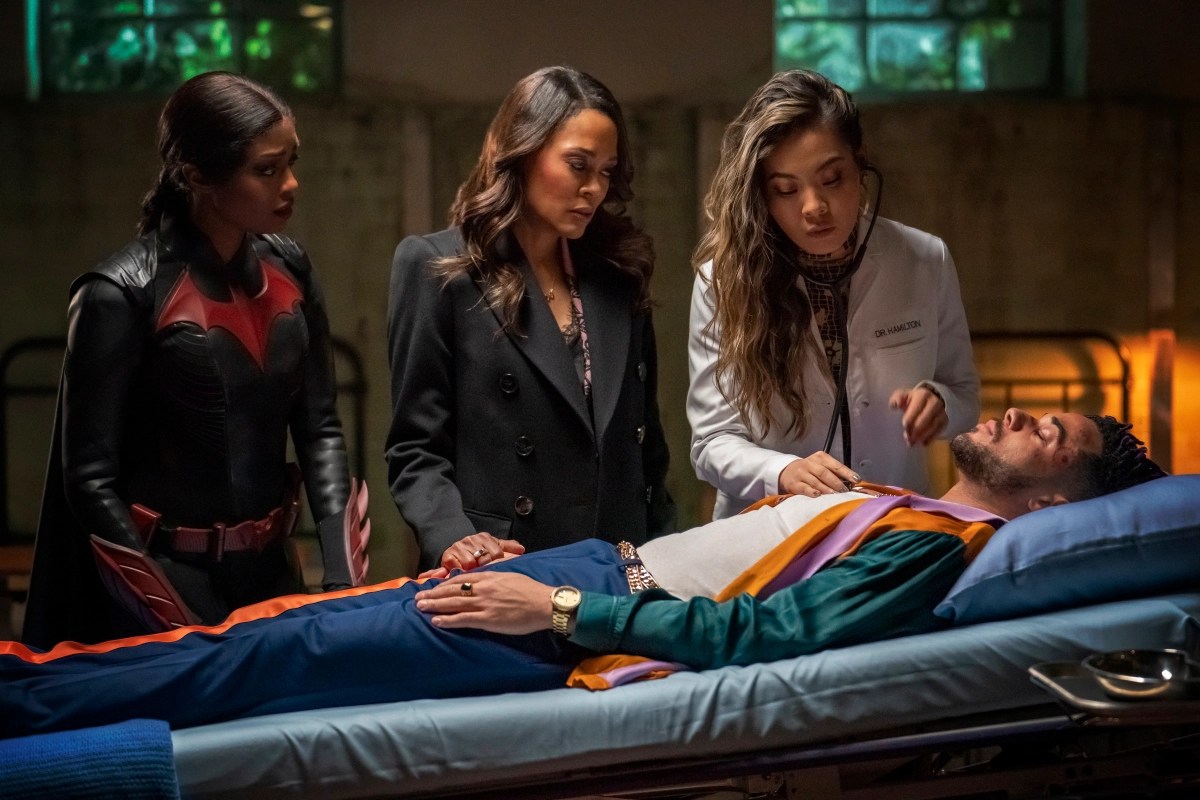
Colin Bentley/THE CW/ © 2022 The CW Network, LLC
“Ryan Wilder was the moment. And should, in fact, still be the moment. Her turn as Batwoman was the reason superheroes were created in the first place. She stepped into the cape and cowl in the middle of a real-life, revolutionary uprising for Black lives. She was played by endlessly charismatic bisexual star Javicia Leslie. She became one of the only Black queer women on TV who got to have a relationship with another Black queer woman on TV. She was surrounded by a supporting cast full of POC, including Victoria Cartagena, who finally got to play the Renee Montoya she deserved (after an infuriating half-season on Fox’s Gotham). In addition to all that, Ryan Wilder’s Batwoman was just fun. And badass. And hilarious. It was important TV, and it was good TV. We’re still mourning the loss.” – Heather Hogan
1. A League of Their Own
Prime Video // Season One
Not yet renewed or cancelled
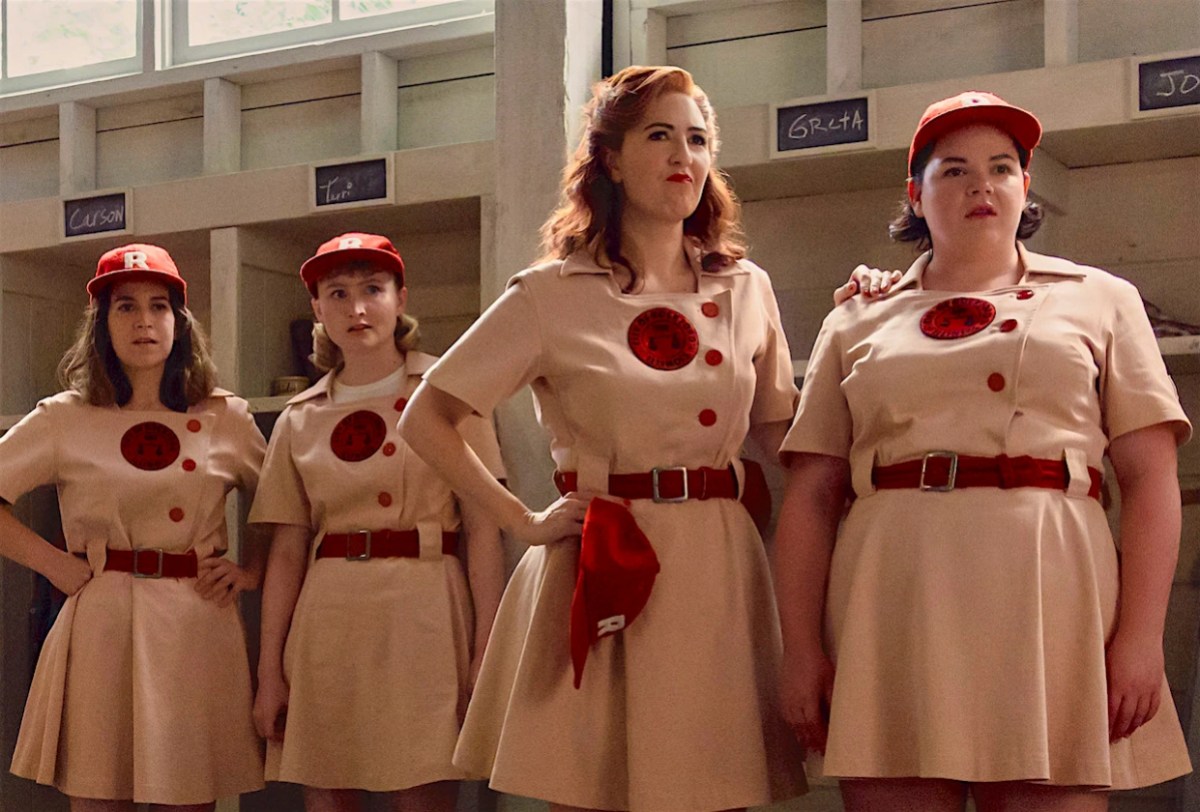
Anne Marie Fox/Prime Video
Copyright: © Amazon Content Services LLC
“It’s safe to say that A League of Their Own blew us away. You’ve seen how it dominated all our year-end lists — because it dominated our hearts! There were so many gay characters to love, and all of them brought something fresh and powerful and vulnerable to the table. From Max and Carson’s journeys to self-acceptance and dream-chasing, to Jo’s journey to stardom, to Jess and Lupe’s brotherhood, to Greta Gill’s femme power, to Sarge’s secret sapphic leanings. We all binged the whole season, and then turned around and binged it again. A League of Their Own honored the beloved film, and it set itself completely apart. We will be devastated if Amazon doesn’t renew it for a second season.” — Heather Hogan
Tegan and Sara’s “High School” Is the Lesbian Teen Drama I’ve Been Waiting For
This Tegan and Sara High School review contains super mild spoilers.
Not too long ago, I was at a WNBA game on Pride Night, seated right next to a high school basketball team. It was the New York Liberty vs. the Chicago Sky, gay players everywhere — Candace Parker, Courtney Vandersloot, Allie Quigley, Stefanie Dolson, Natasha Howard — as rainbows shimmied and shook in the stands. The teenage girl directly next to me clocked my seafoam green Equality cap, my wedding ring, my wife beside me. She told me, excitedly, that she’d come out to her teammates and that’s why they’d brought her here, on this night especially. And then Tegan and Sara‘s “Everything Is Awesome” started blasting and she stood up and screamed, “THIS IS THE BEST DAY OF MY LIFE.”
I couldn’t stop thinking about that game as I was watching High School, Clea DuVall and Laura Kittrell’s TV adaptation of Tegan and Sara’s memoir of the same name, a vulnerable, sincere, highly relatable teen drama about growing up gay in the ’90s. It’s not just about growing up gay, of course, but that’s the main undercurrent for both Tegan and Sara, whom we meet on-screen not as the BFF twin pop duo of modern day fame, but as one sister punching the other sister in the face. Literal growing pains. They’ve been each other’s shadow, each other’s mirror, their entire lives — and now they’re trying to figure out exactly who they are, as individual human beings. Because it’s the ’90s, there’s no BuzzFeed quizzes for them to ask if they’re lesbians, no TV characters to project their experiences onto, no queer YA lit to dive into; they can’t even ask each other about it because they’re hardly speaking. And then they stumble upon their stepdad’s guitar, and as real life Tegan writes in their book, it’s like she already knew what to do with it.

Over the course of season one, through the power of their own songs, both sisters start unraveling the mysteries of their identities, and find their way back to each other.
Tegan and Sara’s complicated relationship isn’t just about being twins, or being teenagers, or being gay; it’s also about the fraught and painful dynamics of teenage friend groups. Tegan and Sara and their pal Phoebe used to be inseparable, but now Sara and Phoebe are freezing Tegan out. It’s not because they don’t love her. It’s because they’ve fallen for each other and are dating in secret. Tegan gets a girlfriend, too; only she doesn’t know it. She’s still not clear on the fact that she’s gay, so when she develops an intense relationship with her new friend, Maya, she assumes they just click. Whereas Maya assumes they’re gonna click and kiss. All of their friendship drama takes place in front of a backdrop of 1990’s thespians, the theater kids of theater kids. It’s a diverse and dynamic friend group, like all the best teen dramas boast.
The story of fictional Tegan and Sara’s casting is already the stuff of legend. Twins Railey and Seazynn Gilliland were working at a pizza place in Fresno, making TikToks like all their friends, when Tegan Quin stumbled onto them and sent their videos to Clea DuVall. Next thing they knew, they were in Canada, working alongside Cobie Smulders, who plays Tegan and Sara’s social worker mom, Simone, to bring the teenage years of the most famous queer twins in history to life. Everyone involved with the show has spoken so fondly of Railey and Seazynn, about the acting and music boot camp they went through, about their dedication to getting this series so right for fans and for the band, about their generous performances and sweet spirits. I’m so happy to say all that comes through on-screen, and even the very few stilted line-readings that make it through play less like stumbles and more like, “Wow, yes, being a teenager is so awkward! Especially being a gay teenager in a small town before even Ellen came out!” Cobie Smulders goes full Canada on Simone, and the results are as excellent as you’re hoping. (Don’t act like you’ve never wanted to be scolded by Cobie Smulders.)

High School accomplishes a lot of impossible things. It honors Tegan and Sara’s memoir. It keeps their story as accurate as possible, and that means including plenty of bratty youthful moments they had the courage to share. It introduces us to snippets of music that will become the songs that launch their careers. And it’s eminently watchable, no matter how little or how much you know about actual Tegan and Sara. It’s just a damn good queer teen drama, one I’d be praising even if it was about two imaginary people I’d never even heard of.
The reason I kept thinking about that WNBA game while I was watching this show l is because I wondered what High School-era Tegan and Sara would think about it, how it would feel to know that their quiet teenage turmoil, their tentative queer exploration, would one day manifest itself in music that’d have other queer teens shouting and celebrating their gayness loud and proud in New York City. No, everything’s not always awesome, but when we wake up, life really is a surprise.
Talking to Tegan and Sara About Becoming Characters in Their Own TV Show
Feature image photo by Araya Doheny/Getty Images
I’ve never fastened my emotions to a memoir the way I did with Tegan and Sara’s High School, an open-hearted, open-handed first-person narrative of their teenage lives in the ’90s — before they became Tegan and Sara. It is so deeply, precisely personal; yet broadly relatable. I shouldn’t have been surprised. That’s kind of their whole thing. Now their book is a TV series, written and directed by Clea DuVall and Laura Kittrell, that lands tomorrow on Amazon Freevee. Just in time for the release of their new Crybaby album and tour, and the release of Sara’s actual human baby. Somehow, between the music and the show and the parenting/aunting, Tegan and Sara found time to chat with me about the challenges and joys of bringing their story to the screen.
https://www.instagram.com/p/Cf9KNLOAVqp/
Heather: Tegan and Sara, thank you so much for talking to Autostraddle today.
Tegan: Oh my God, we love Autostraddle! So nice to see you, Heather.
Heather: You too. I also want to thank you both personally. Your music, your writing, the work you’ve done with the Tegan and Sara Foundation, the way you have modeled queer community building — all of that has been so vital and aspirational to me in my life. This is a cool, full-circle moment.
Tegan: Ah, that’s amazing.
Sara: Thank you.
Heather: Whose idea was it to launch a tour, a new album, a TV show, and a literal baby at the same time?
Tegan: [Laughs] Not good planning on our part. Every time we do this we’re like, “We’re only going to do one project at a time” — and then what can we say? We just get inspired. The show was happening and we had time to write a record. I mean there’s amazing opportunities that come because of the show, to help shine a light on us as a band, because we continue to just muck about in this sort of indie, sort of mainstream world. We’re always sort of straddling those worlds, but it’s like hella stressful right now around our world.
Heather: I’m sure! Are you on the road already?
Sara: Not yet.
Tegan: Just some promo trips and stuff. But my mom’s coming, Sara’s bringing her partner and the baby. It’s going to be a full family affair here in about three weeks.
Heather: Amazing. And your dog also? Is it going to be—
Tegan: No, I’m not bringing the dog! Dog’s staying home!
Heather: [Laughs] Baby, yes. But not the dog! That’s one step too far!
Tegan: Gosh. Heather, don’t be crazy.
Heather: Let’s talk about this show! I love it. I loved your memoir. I listened to the audio book as well, which I thought was just wonderful. The show is such a heartfelt representation of your story and it’s also adding a real modern sensibility to these ’90s era experiences. Is there a different level of vulnerability that goes into allowing someone else to take your story and tell it, rather it than telling yourself?
Sara: Yes. The answer is yes. I think that’s the most complicated part about this process. Tegan and I spent a lot of the early part of our career knowing that if we were going to be successful in communicating directly to our audience, it meant that often we had to put in that extra work to build an online community when it was still very new, to spend time talking with our audience and community building in person at our shows. There was a lot of work that went into really being — quite literally — the face of our band; not relying on things like radio or press or TV. There’s a sort of strange irony in now telling our original origin story, but really having to let someone else do it, and not necessarily have a ton of control over how it turns out.
Heather: You chose who to turn it over to wisely, I gotta say.
Sara: Yes. For us, the biggest thing, in working with Clea, who is a friend, was just a sort of a request and an understanding that we would continue to be involved in the conversation. We read the scripts, we leave notes. Whether or not those notes are always adapted or implemented was less relevant than if we just got to have those conversations. Even just sort of texturally, to give that perspective to Clea and Laura as they were writing, just so those little details, at least for us, were captured in the show and make it feel really authentic.
Then obviously just from the completely brand perspective, the show is called High School, but the characters are Tegan and Sara. We are still an active IP. We are going on 23 years without a cancellation or a major scandal. When you hand over your name to other people — and not just the show but the people, the actors who play us — there’s a lot of opportunity for things to go sideways. It’s a big trust fall where you’re just flailing through the air, waiting and hoping that there’s a soft landing. It’s really scary. But I think art requires a kind of surrender and a risk. I think Tegan and Sara, we’re still trying to make art that surprises people and this feels scary, so I think that that probably means we’re on the right track.
Heather: What part of this TV creation process came the most naturally to you? You’ve been creating art together for so long, so collaboratively, and this has to be a different experience.
Tegan: I think actually we are very collaborative because everything we do, not only with each other, but you collaborate with co-producers and engineers and the record company and our creative director and the band. I think probably the hardest part was that we were all of a sudden having to collaborate with somebody who maybe doesn’t always collaborate, and it’s not quite as effortless. Clea is incredible and is our friend and is caring and empathetic and loving and knows all of our people, but we would often share our opinion and it would be like, “Well, just let me do what I’m doing.” Whereas, in our world it’s like, “No, you will hear me out! You will hear my ideas!”
I think we probably take for granted how much we collaborate and that there’s conflict that comes from collaborating and that’s normal and healthy and we just have to go through that. Clea and Laura are incredible and got through it with us — we all love each other and are friends and all hope we get a season two, so that’s a good sign. But yeah, collaborating comes naturally to us, but it’s not natural for everyone else and we push it on people like it is — and that’s intense.
Heather: My best friend is my sister; I understand a little bit about that dynamic. Were there things in your memoir that you felt comfortable putting on paper that you did not feel comfortable putting on television?
Tegan: Yeah. That’s a great question. I know we have such limited time, so I’ll just say, I think probably generally speaking, there were things that felt deeply personal, that felt like okay to share in the book — but then for the show, it was like, well, we’ll have to delve into the other characters. I think we were careful about how to portray those other characters. That’s probably where Laura and Clea fictionalized the most or did composites of people the most: the characters around us. Most of these people are still alive, they’re still in our life. My mom’s a therapist, so how do we portray her as a therapist on TV becomes really complicated because you don’t want anyone to watch the show and go, “Wait, that character must be me!”
Heather: Right.
Tegan: It’s like Sara said, it’s a lot of trust and complications. The book is its own entity. I really hope people who watch the show go and explore the book, if they haven’t read it, because it’s a different thing. But yeah, that’s definitely complicated.
Heather: Did you feel as much of protectiveness over these other peripheral “characters” in your life as you did over your own story? You’re nodding vigorously.
Tegan: More. Much more.
Sara: More. More. More. I think Tegan and I have been exposing ourselves and our lives for so long — I guess “exposed” almost feels like the wrong word. We’ve been really transparent and open about our lives and our relationships. But music is kind of abstract, it’s like poetry or something. Television is like fucking television. It’s exposing. I mean, every moment of being protective or diligent about details was about protecting our friends and family and hopefully getting out of this without lawsuits or people disowning us.
Heather: One thing I’ve asked everyone today, I especially want to ask you: If there’s a need for either of you to get into this ’90s head space, what’s your go-to album?
Sara: Anything by Smashing Pumpkins, for sure.
Heather: Hey, just like Book Sara.
Tegan: I would say Hole. When we started working on the show and we started sending back and forth songs, Clea sent a couple options for Hole songs and I went back and just went deep and was just like, “Oh God, yeah.” It transforms me to Grade 10 immediately.
Sara: Actually, not for Grade 10, but we just recently got to talk with Ani DiFranco for the first time and I spent some time with Living In Clip again, and man that album is like…
Tegan: So 12th grade.
Sara: So ’90s.
Heather: So gay.
Tegan and Sara’s High School lands tomorrow on Amazon Freevee.
Chatting With Clea DuVall, Cobie Smulders, and Laura Kittrell About Tegan and Sara’s “High School” TV Show
When Tegan and Sara finished their 2019 memoir, High School, and sent it to their longtime friend Clea DuVall, she called them up and told them: a) she loved it, and b) not to sell the rights to anyone else. She told them if they were ever going to make a TV series or a movie about their lives, they’d want creative control. Tegan and Sara listened — and three years later, they’re getting ready to launch their television show based on their book into the world, written and directed by Clea and queer writer Laura Kittrell.
The series, which lands on Amazon Freevee this Friday, stars newcomers Railey and Seazynn Gilliland, queer twins Tegan discovered on TikTok, as the world’s most famous gay duo. Their mom, Simone, who is heavily featured in their memoir and still a huge part of their lives, is played by Cobie Smulders. The show is jam-packed full of coming of age relatability, ’90s nostalgia, and so much delightful gay teen angst. (I can call it delightful because, like Tegan and Sara, I’m in my 40s now.) I had a chance to chat with Clea and Laura, and also with Cobie and Kyle Bornheimer, who plays stepdad Patrick, about the joys and challenges of making a series about very famous, very gay, very real pop stars.
Clea DuVall and Laura Kittrell

Heather Hogan: It seems like a daunting task to make a series about these beloved real life human beings, whom you know. Clea, you pitched the show to them, is that right?
Clea DuVall: Yeah, yeah! I read their book and fell in love with it and could just so clearly see it as a television show. Also Tegan and Sara being my friends, I just felt so protective of them and protective of their story and protective of the people in their lives, and didn’t want them to just sign it away to a stranger and have no say in it. I really wanted them to feel good about how their story was being portrayed, but it was daunting. We’ve been friends for 15 years and we could have gone through this experience and they could have been like, “Nope, no more. Sorry, you ruined it! You took our beautiful book and you totally screwed it up. Great job.” But luckily that was not their reaction, but probably a lot because I found Laura.
Heather Hogan: How did you become part of this series, Laura?
Laura Kittrell: I heard about the show when everybody else heard about it. So I was very excited just as a fan of everybody. And then I think maybe a year after that, Clea had already written the first two scripts and she’d outlined the third, and my agents had sent it to me and said that they were looking for somebody to work with Clea on the show. And so I read the scripts and I read the book and I was like, “This is a disaster. They need me. They need me. I got to save it. I got to get in there.” No, I’m obviously kidding. It was incredible. Everything that I already loved about the book and felt so seen by, with the book, Clea just enhanced even more in her scripts. And I just was like, “I’m just thrilled to watch this regardless.” And the fact that I am now working on it is a little surreal still.
Heather Hogan: That’s amazing. What are some things from the book that you knew you needed to bring to the screen? And were there any things that were like, “No, we can’t touch that.”
Clea DuVall: There were definitely certain things that were in the book that Tegan and Sara did not want in the show. And we wanted to always make sure that what we were portraying, they felt comfortable with. For me, I really wanted to capture how internal their experience is — especially in the ’90s, of coming of age and discovering your sexuality was so nuanced, it was so internal and it was quiet. It was a quieter experience. And just sort navigating all these feelings you’re having. Even as you’re doing things that are very clearly pointing you in a certain direction, how you’re still kind of like, “But what does it mean? What does it really mean?” When I read it in the book, I just felt very seen by it and thought that it would be such a great thing to explore and capture in a television show.
Heather Hogan: Right.
Laura Kittrell: I think the greatest compliment we’ve gotten — I heard it when we screened at the Toronto International Film Festival — was somebody in the audience was saying how happy they were to see a show that wasn’t cynical at all. And I’m happy that’s coming across. Is it, I don’t know if it is obnoxious to repeat your own compliments?
Heather Hogan: It’s absolutely not obnoxious, and I agree with this person.
Clea DuVall: This is just Laura all the time. She’s like, “Someone said my new shirt was nice. What do you think?”
Heather Hogan: Just reading and quoting those Rotten Tomatoes reviews to herself.
Clea DuVall: “The guy at Whole Foods loves my shirt!”
Heather Hogan: I think my favorite thing about the show, because I was a teenager in the ’90s too, is that you really found this fascinating balance between getting into the head space of being a queer teen in that time period, but also bringing a real 2022 representation sensibility to the series. It seems impossible, but it works so well. Can you talk about the merging of those two realities?
Clea DuVall: We really wanted the show to feel timeless. We never wanted it to be winking at the audience and being like “The ’90s? Remember Xena?” We wanted it to feel like a show that could be now, or it could be that 30 years ago. It was purity of story was always what our drive driving force was. I think that’s how that was created.
Heather Hogan: If you need to get into a nineties head space, right this second, what album would you go to?
Clea DuVall: I think Hole’s “Live Through This” or PJ Harvey’s “Dry.”
Heather Hogan: Very nice.
Laura Kittrell: Yeah, my driving around CD was always “Okay Computer” by Radiohead.
Heather Hogan: Oh wow you were so cool so young, Laura. What are you both hoping people connect with most about the series?
Laura Kittrell: I think it’s maybe different for different people. My connection to it was really from a queer lens. This felt like so much my own high school experience was with my friends and my romantic relationships. It made me very excited to put that out there. I grew up in the South as I think you did based on your accent.
Heather Hogan: Yes, this is Georgia you hear.
Laura Kittrell: I didn’t know any gay people in high school. TV was incredibly important to me because it was where I was meeting gay people for the first time. But then we’ve had friends who watched the show who are middle aged men who love the stepdad and that’s their entry point. I’m happy that we have different entry points for different people.
Heather Hogan: Can you talk a little bit about your casting process? It was a little unconventional.
Laura Kittrell: Well, Tegan’s algorithm provided her with a video of Railey, who plays Tegan. And so Tegan and Sara sent us some videos that Railey and Seazynn had done together and said, “What do you think?” We had been auditioning people who were great. I think most of them were probably not queer, because I don’t think that finding queer twins was quite as easy as we thought it would be somehow.
And so Railey and Seazynn had no acting experience and we were a little, “I don’t know how this is going to go.” They met with an acting coach for a week, came in, auditioned with us, just like blew us away. It was incredible. Basically went into boot camp, taking acting lessons, taking music lessons, working so hard. I mean, having to carry an entire show on their backs, basically. Coming from working at a pizza place in Fresno, this is not an easy job that we have given them. They’ve just surpassed our expectations and I’m so happy for people to get to see them on the show.
Heather Hogan: That’s amazing.
Clea DuVall: They’re Incredible. I am so proud of them and just love them so much.
Cobie Smulders and Kyle Bornheime

Heather Hogan: Cobie, It is really important for me to tell you, you’re a lesbian icon. I’ve had like 50 people tell me in the last three days that you didn’t know that.
Cobie Smulders: Maybe you can help me understand this. I found out about this at TIFF a couple weekends ago, and I don’t why. Maybe I just met my husband too early in the game, you know what I mean? And it could’ve been a very different path for me if I had the right woman. It’s very true.
Heather Hogan: And also, you could be married to a man and still be lesbian icon! My friends call Halloween Cobie Smulders Season because you can go as Maria Hill, you can go as Stumptown’s Dax Parios, as Robin Sparkles. Now we’re adding this Mommi gayness to it.
Cobie Smulders: Oh my gosh.
Kyle Bornheimer: Obi Wan.
Cobie Smulders: All you basically need for all of those characters is a pair jeans and a t-shirt.
Heather Hogan: Well, now we’re getting to an answer.
Cobie Smulders: Amazing.
Heather Hogan: I want to ask you both: How familiar were you with Tegan and Sara before you started working on the show?
Cobie Smulders: Well, I grew up in Canada, so I was very familiar with them, have loved their music for a very long time. And there is a rule in Canada, I’m going to get the percentage wrong, but it’s something like 60% of the music played on the radio has to be Canadian content. So there’s like certain people listening to Tegan and Sara on the radio, Alanis Morissette, all of these people, they’re the biggest musicians in the world. Their songs are literally playing on a loop and then you leave Canada and you’re like, “Oh, they’re still playing” — and people know them, but they’re not like as known as they are to me. I didn’t obviously know them personally, I didn’t know the amazing story that they wrote in their biography. So I discovered that when the show happened. But I find it pretty cool that I have their email addresses.
Heather Hogan: What about you, Kyle?
Kyle Bornheimer: I also find it very cool that I have their email addresses. When you’re an actor and you can find yourself associated with rock stars, you feel very cool. Because as cool as we think we are as actors, we don’t have anything on rock stars. So I feel cool just being in their presence. I was familiar with a lot of their bigger songs and because I have kids that were young when The Lego Movie came out. So Tegan and Sara were able to check a couple cool boxes for me when I took this job on.
And like Cobie said, I did not know their full story. I really read their book in one sitting because it was written in such a revealing way. And they really just opened themselves up. And I found that I was really taken with not only their story: how they didn’t paint themselves as saintly; they were just human beings, struggling like we all do. And sometimes being brats about it and sometimes being their best selves about it. In high school years, where it’s very hard to be your best self. We’re all just brats during that time. And they shared that with us.
Heather Hogan: Yeah, absolutely. One of the things I love about the show is how queer it is — but there are other places for people to get invested. And a lot of that has to do with your characters who have really fulfilling arcs, even outside of Tegan and Sara’s main storyline. Can each of you talk a bit about your characters?
Cobie Smulders: I’m playing Simone, who’s the mother of the twins, and I haven’t ever played a mother on a project — and I just jumped right into being a mother of teenagers. Sometimes I think when you come into that role, it’s very one dimensional. It’s very, you’re just nagging. You’re the one who’s like, “Do your laundry” or whatever. And there was certainly that in this as well. But it was wonderful to be given the gift of showing the intricacies of this relationship that Simone and Patrick have together. That Patrick was not the biological father of these girls, he’s a stepfather. So it’s a second relationship for her. Certainly a very stable one. And they’ve been together for a while. What would you say, Kyle? Over ten years, right?
Kyle Bornheimer: In real life it was 14 years, I think.
Cobie Smulders: He came in when they were little babies. So they’ve really created this life together and I think they created that life together out of necessity for Simone. As a 20-year-old woman who has twins, that’s a huge job to take on. So being able to count on a partner like Patrick, who was so caring and so present, was a need she had back then. Now we cut to 14 years later, now the girls are independent, they are doing their own thing. And she’s in this place where she’s looking at her life and going, “What do I want now that I am allowed to ask that question.” And so that’s being presented in this first season and she’s sort of reevaluating her relationship. She’s reevaluating her career and that’s sort of a tough, hard thing to do.
Kyle Bornheimer: I think one of the gifts that Tegan and Sara have that lends to this project is that their parents weren’t typical. There’s so many different stories about people coming out and finding their sexuality and having to communicate that with their parents. And we’ve seen lots of versions of that and they’re all valid. They had mother that was progressive, even for her time with that, but was still a mom. And whether you are queer or straight, whether you have the most progressive parents in the world, adolescence is hard. You’re still dealing with societal pressures and friend pressures and your own sense of self and the media and all that stuff.
Patrick is a little more of a typical dude of the time who wasn’t comfortable talking about that stuff, hadn’t really thought about it. And when he did think about it, he thought about it in of a default, gay panicky kind of way. He’d rather not talk about it, he’d rather it wasn’t a thing he had to deal with. They don’t have to hide it. I mean, they’re hiding it in terms of they still don’t know themselves and they’re not advertising it to anyone, but they can confront him about his own backwards views because they’re at the very least, even if they haven’t come out or they don’t know themselves, they’re at least in line with the 90s progressive ideals. We’re going to see these two evolve a little bit.
Heather Hogan: I just asked Clea and Laura this, so I’ll ask you too: If you needed to get yourself into a quick ’90s head space, what album would you put on?
Cobie Smulders: Anything by Nirvana. We were just talking about this. So there was Nirvana or Green Day. There was that thing that happened, and then Dave Mathews came into my life. Ben Harper, I was like, whoa. I was a new person. Halfway through the school year, new person. And I totally forgot, because Dave Matthews was late 97, 98, right? But I have such nostalgia for Kurt Cobain and Nirvana. But then also there’s Paul Abul is coming up for me. It was kind of a wild time for music, wasn’t it?
Kyle Bornheimer: Yeah. There was a lot of pop. I mean, the alternative stuff was sort of answering pop.
Cobie Smulders: Yeah. And ’90s hip hop. Tupac, Biggie, Puff Daddy, all of that. Busta Rhymes. I mean, it was a wild, it was very eclectic.
Heather Hogan: That is a very chaotic playlist, Cobie Smulders. Kyle, what are we going to do to increase your lesbian icon status before season two?
Kyle Bornheimer: I think this show’s going to help me a lot, that’s really why I did it. It was a very self-serving job in that respect. I needed to check off that box. So please help me all you can.
Heather Hogan: All right. I will.
Kyle Bornheimer: I really need this.
Heather Hogan: What’s your flannel situation?
Kyle Bornheimer: Well, I mean I was pretty flanneled up in the ’90s, but also what I did in the nineties is I dressed like I was in the seventies. We liked to look like we were dressed in 1972. A lot of faux leather jackets and butterfly collars.
Heather Hogan: Oh, that’s great. We can work with that.
Cobie Smulders: I feel like Patrick is wearing a lot of what we call up north, “the Canadian tuxedo.”
Heather Hogan: “Is it Canadian or is it gay?” is always fun game to play. And then there’s Tegan and Sara, who are both!
The Trailer for Tegan and Sara’s TV Show Is Here, Queer, Walking With Their ’90s Ghosts
The trailer for Tegan and Sara’s High School, the forthcoming TV series based on their memoir, has landed and it is full of 90s fashion, teen angst, twin drama, and oh so much more. High School, which stars queer twin TikTok sensations Railey and Seazynn Gilliland as Tegan and Sara, is executive produced, co-written, directed, and co-showrun by Clea DuVall. By which I mean: High School is also full of LESBIANS. Oh, and Cobie Smulders is their mom. Canada! (I hope they shoutout Robin Sparkles’ “Let’s Go to the Mall” at some point.)
As a closeted ’90s teen myself, I genuinely loved Tegan and Sara’s High School. So, if you’ll forgive me, I’ll just quote myself about it.
Tegan and Sara alternate writing chapters as they navigate their way back through conservative Calgary, Canada in the ’90s. The narrative builds and then brilliantly cuts out right before their careers take off, but their trajectory is anything but smooth. They teach themselves to make music when they find their mom’s boyfriend’s guitar in a closet under the stairs. They learn to write songs; they learn to harmonize; and, as they’re doing it, they’re pushing against and tearing at each other and slamming their bedroom doors so often the boyfriend takes them off their hinges… But their music is just the backdrop. They both struggle to accept their sexuality, to parse out their internalized homophobia, to come out. Despite their rising fame, they’re both consumed with loneliness. “In those first few months of high school, I learned to avert my eyes, to show them submission, to be a ghost,” Sara writes. She listens to Mellon Collie And The Infinite Sadness alone in her bedroom and cries.
So, you know, if you’re a ’90s kid, you’re probably going to relate to/cry about this one too! And maybe you’ll tie a flannel around your waist and clomp around in ripped jeans too. Just for posterity.
High School premieres Oct. 14 on Amazon Freevee.
Tegan and Sara’s “High School” Series from Clea DuVall Is a Go! Scream Loudly If You Must
Back in October, we learned that Clea DuVall was adapting Tegan and Sara’s best-selling memoir High School into a television series and we promptly sounded the lesbian alarms. Well! Now we are so excited to give an update — High School: The Series (my name, just to distinguish from the memoir, not theirs. And not to be confused with High School: The Musical — or maybe its High School: The Gay Musical? Tegan and Sara, call me!) will be officially produced as a series for Amazon’s IMDb TV.
The show was announced as a part of Amazon’s first-ever New Fronts presentation on Monday. It will be produced by Amazon Studios and Brad Pitt’s Plan B Entertainment. It will also be executive produced by all three lesbian icons (Duvall, the Quin twins).
High School (the memoir) was released in September 2019, chronicling Tegan and Sara’s coming-of-age as Canadian teenagers and their rise as musicians, alternating their perspectives. Filled to the brim with 90s nostalgia, when the book was first released we promptly declared that it would “heal your teenage heart.”
The series, according to Variety, will pick up on that same sweet, sweet refrain, creating a story “about finding your own identity, a journey that is made more complicated when you have a twin whose own struggle and self-discovery closely mimics your own.” It will be told against “a backdrop of ‘90s grunge and rave culture, [that] weaves between parallel and discordant memories of twin sisters growing up down the hall from one another.”
Ok so now you probably have at least one remaining question… what is IMDb TV? That has an easy answer: It’s Amazon’s free, ad-supported streaming service. And now for the incredibly early planners among you (it’s a gay thing, we understand) — how on earth you get to this streaming service? Great news, I’ve already looked it up! If you have an Amazon Fire Stick, it already comes loaded onto the device. If you have Roku, Apple TV, or just want to use your web browser — you basically just have to download it or sign up. Yes, we are still a while away! But I know you wanted to know!
In their official statement about the news, Tegan and Sara confirmed that they have made some casting suggestions to DuVall and Plan B Entertainment, but mostly they just wanted to “apologize in advance to our mother for forcing her to relive this period of time with us again.”
Then, with the fancy business out of the way, they took to Twitter and added that they were as shocked as anyone that their “degenerate” years were being turned into a television show.
No one is more shocked than us, that after a VERY difficult couple years in high school, doing copious amounts of drugs, skipping school, lying + being all around degenerates that we made it this far in our musical journey. THAT story is headed to @IMDbTV https://t.co/KB2ezcZKUN
— Tegan and Sara (@teganandsara) May 3, 2021
We absolutely cannot wait.
Were We Ever So Young: A Retro High School Deep Dive with Tegan and Sara
If you experienced your baby gay years, regardless of your actual calendar age, in the 2000s your adolescence may well have been set to the soundtrack of Tegan and Sara. Whether it was the yearning of I just want back in your head, the codependent confusion of Are you alright, can you get me off your mind? or the uncut dopamine rush of Well, I know what I want and what I want’s right here with you. It was the perfect score to so many of our teenage angst, obsession, identity questions and debilitating crushes.
There’s a reason Tegan and Sara seemed to know more about what was going on in your head than you did — it came from their own teenage angst, obsession, and everything that comes with it. It’s all detailed in HIGH SCHOOL, where Tegan and Sara take turns in alternating chapters opening up about their struggles with identity and sexuality, their parents’ divorce, and their relationship as sisters and musicians. It’s the origin story of Tegan and Sara – and also a personal reveal about how the trajectory toward global gay superstardom also has plenty of room for being teenaged, confused, and questioning.
Inspired by their vulnerability and the powerful throwback energy of high-school-age Sara and Tegan, we’ve cracked open our own high school diaries to show you our deepest, darkest, gayest secrets and send a little love and perspective back through time on who we’ve been.
Malic
2003/2004
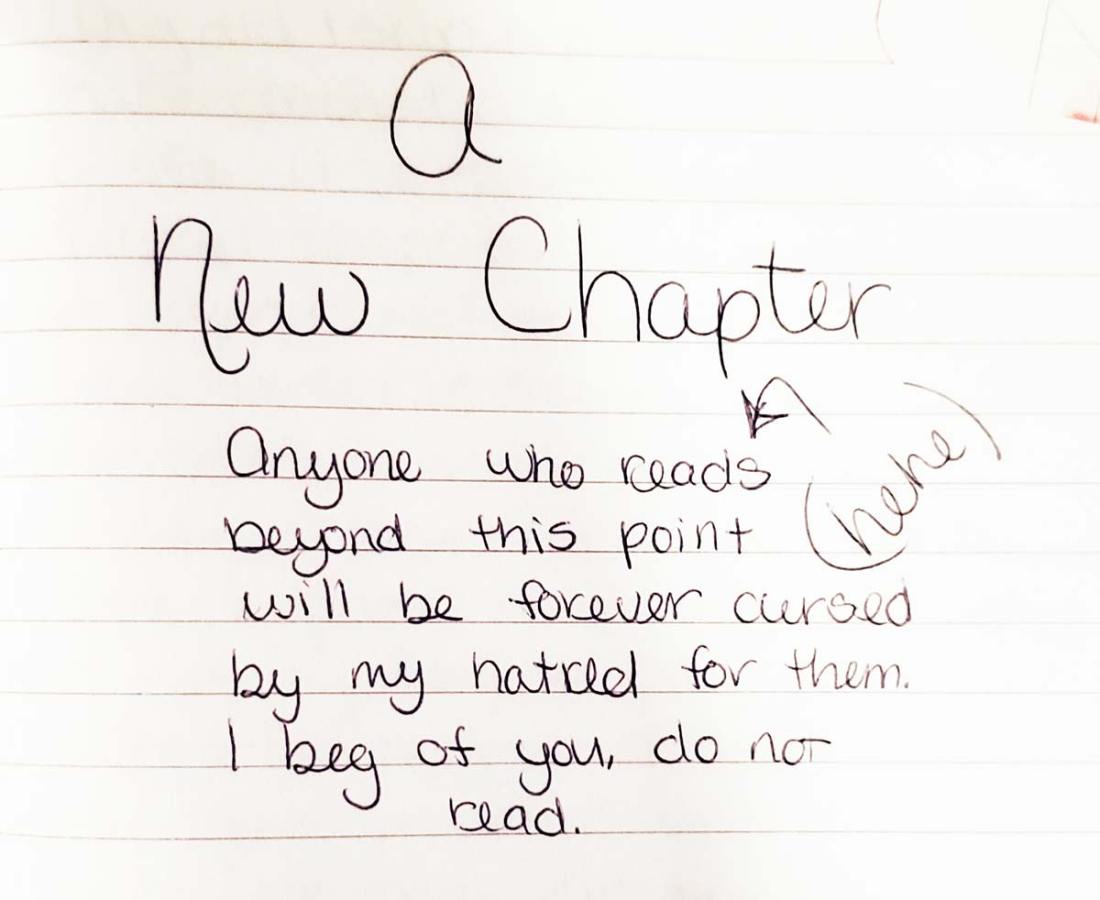
A New Chapter: Anyone who reads (hehe) beyond this point will be forever cursed by my hatred for them. I beg of you, do not read.
2004

I’m beginning to think that I don’t just like [redacted]. I love her. It seems as though I never stop thinking about her. She turns up in all my dreams. Every morning I wake up thinking about how I can’t wait to see her. [redacted] is so beautiful. She has the most gorgeous, sot hair and killer eyes. I mean *amazing* eyes. They’re blue-green like the color of lake water. Her skin is so *soft* too. The rest of her body is incredible to say the least. I’ll just say that she’s well-endowed, and the things that have been endowed upon her are… great.
2005
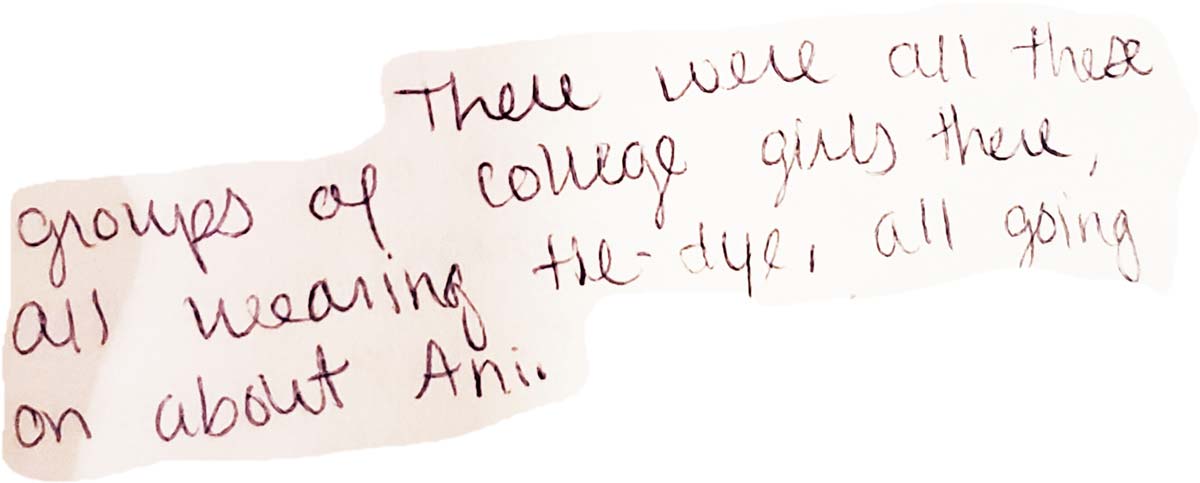
The concert was beyond-belief AMAZING! I loved watching the fans. They all dressed like punk hippies. Apparently that’s how you’re supposed to look for the occasion of an Ani concert. There were all the groups of college girls there, all wearing tie-dye, all going on about Ani. I envied them. I love my friends, I really do, but some days I wish I could be with a group of people like me.
Drew
2010
Getting
And so I decided to forget you
To place you in that little compartment
Deep, deep
In the back of my mind
To reject myself
And save you the trouble
To erase non-existent memories
And remember the real ones
This worked for awhile
For a day or a year
Forgetting, always forgetting
Actively erasing
I guess I hadn’t counted on you talking again
Or smiling again
Or laughing again
But it seems you did
And I did too
You know I’m thinking about forgetting you
Really this time
Really forget
I wish you wouldn’t forget me though
I really wish you’d remember me
Unfortunately for me, and maybe now for you, my high school journal writing took the form of poetry. I had a lot of feelings and cataloguing my day-to-day in prose simply couldn’t capture them. I wish I could say the poems were good, and maybe one or two were, but most of them were very, very bad. Most of them were angsty love poems. Instead of choosing one of the maybe good ones, I’m going to be brave and share one of the very bad ones. You’re welcome.
Drew, 2019
Valerie
2005

Godspell was absolutely amazing. By far the best show I’ve ever been in, ever. I thought nothing could top Crazy for You — boy was I wrong. I’m going to miss every single person in that cast, even the ones I only met this year like Jacqui. I feel like I’ve known her forever and it’s only been 3 months. And Stacy. We’ve been buds since we were the gate together in The Wiz. Love that chick. I feel like we got closer this year than any other year, but I don’t really know why or how to explain it. She called me today! It was exciting. In free today, we went to confession and Mike was there and we must have made a bajillion Godspell references while we waited, then discussed whether heaven had levels like basements and penthouses. After Mike got out of confession he called me and Stacy lesbians (again) and said he wanted to get in on it (still/again) so we tried to send him back into confession. “Bless me father, for I have sinned, it’s been… TWO MINUTES.” Far too much fun for a chapel, let me tell ya. “When you get to heaven you’ll be blessed — yes, it’s all for the best.”
If I had to make a quick guess, I’d say at least 50% of my high school journal(s) involve talking about the things I loved about the girls I knew. This entry happened toward the end of my senior year, when all of the gay feelings I had been trying to tamp down since eighth grade were finding new and exciting ways to bubble up all the time. For example, in my obsession with the varsity girls’ volleyball team. It’s funny, because though I wouldn’t have been caught dead admitting it at the time, it’s clear to me now reading this entry back that despite my attempts to hide it, even from myself, the queerness was seeping out of my pores. “I don’t really know why or how to explain it.” I’m so sure. Also boys very rarely make an appearance in these high school musings, and when they do they’re either an awkward attempt to sound how I thought teenage girls “should” sound when they talk about boys (it’s embarrassing), or to relay stories like this. I do remember this vividly though, the two times Mike made a joke that Stacy and I were lesbians. Both times, his sleazy follow-up question was an easy out of the conversation and a great way to distract myself from the way my heart sped up at the mere suggestion.
PS. Can you tell I went to a Catholic School?
Valerie, 2019
Christina
2006
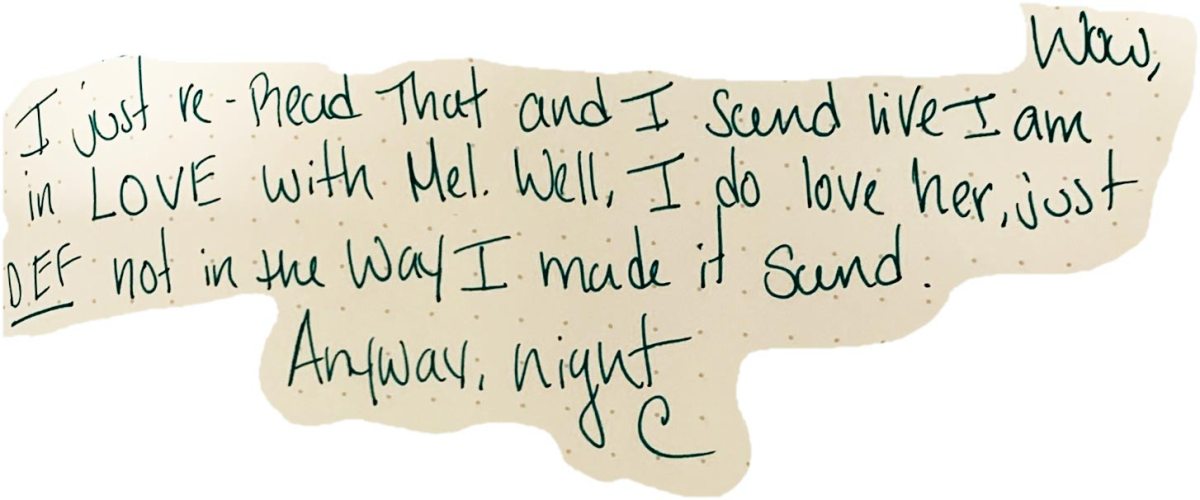
So this time period right now is a very strange one, in which I should be applying to college and writing essays, but I’m honestly just sitting down and like… thinking about what I want to do. It’s very strange. And refreshing. I mean, everyone seems to be on this notion that I’m only applying to art school, but let’s be real — I’m not just good at photography. I love reading, writing, and analyzing things to the point where I just don’t care anymore. That feeling when you just sit down and write things, thoughts, feelings. I can’t pretend that I’m all about photography just because I went to Millstreet and did AP Studio.
I guess I’m just in a “what does it all mean” phase that everyone goes through around this time of life… it’s just harder than I thought it would be. And now that swimming is over, I can’t pretend that I’m busy… because duh, I do nothing.
Swimming is over. I guess it’s one of those “hindsight is 20/20” things, because it’s NEVER meant this much to me. And now I see the girls I saw every day and I realize that we don’t travel in the same circles and I mostly won’t get to see them. I can’t even think about not hanging out with Mel and Jen. Mel has become one of those people I will trust no matter what, I know I can tell her pretty much anything and she will listen to me/give me advice that is REAL. And not getting to see her every day, not joking around with her, not making fun of her is… hard. Yeah, hard is the word. Wow, I just reread that and I sound like I am in LOVE with Mel. Well, I do love her, just DEF not in the way I made it sound.
Going through my old journal was a truly eye-opening experience. Well, more of a “wishing my eyes were tightly closed so I could avoid this full body embarrassment,” kind of experience, I suppose. There were entries aplenty to choose from, including one that said in all caps “JACK JOHNSON IS LIFE,” but this one from the fall of my senior year was filled with the right mix of doubt and pseudo deep thoughts. I don’t think it needs to be said, but just in case — yes, I was 100% in love with my swim coach.
Christina, 2019
Sarah
April 15, 2003 (7:30)
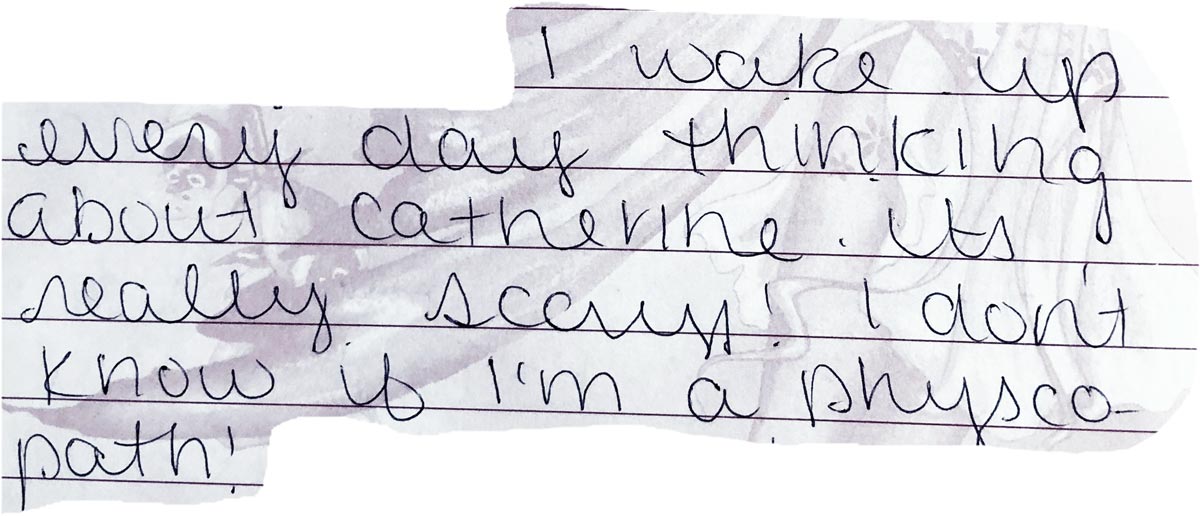
I tried not to talk about Catherine [Zeta-Jones] today but it was pretty hard! On Friday night after school me, Beth, Keva, and Kaitlin are going to have our Zetathon! =) I thought up the cool idea of making souvenir tees! I think that would be soo cool! Like get pics of the movies we watched and write “Zetathon 2003” on them and on the back it’s going to have the movies we watched. Haha, I’m excited! We might buy fabric paint too, and rhinestones. LMAO! That would be so great! I wake up every day thinking about Catherine. It’s really scary! I don’t know if I’m a pyschopath. Oh well. I hope no one ever finds this, they’re going to think I’m a complete loser! – Sarah (7:35)
This was about a month into my obsession with Catherine Zeta-Jones. I had somehow convinced all my friends to skip school and watch a bunch of her movies [the Zetathon]. About three months later I found myself writing a very, erm, detailed erotic fan fiction about CZJ that finally helped me come out to myself. Listen, being gay is a journey and we all get there eventually.
Sarah, 2019
Heather
October 15, 1995
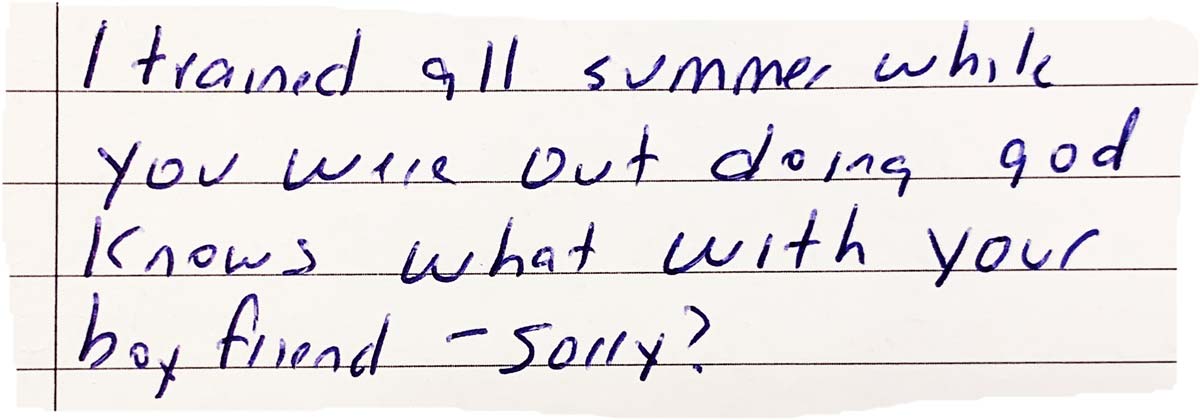
Today was the first day of conditioning. I said I would take Craig’s advice and not come in cocky even though I’ve been training on this course all summer and cross country season. I stayed behind Kristi the entire time because she prides herself on being the most in shape. At the road drop-off I came out right behind her. She stopped — very winded. I stopped too (not winded). I said “shit whooo” like I was tired. She snapped at me not to cuss so I just laughed and ran my own pace back. By the time she got back to the track, I’d done a full extra mile. It was cocky, I know that. She was furious. I hate Whatever. I don’t know why I should pretend to be worse than her to make her feel better. I trained all summer while you were out doing God knows what with your boyfriend – sorry?
Shot around about an hour after with the boys team. 4 on Andy, 6 on Blake, 2 on Michael.
If I hear one more thing about homecoming, I’m going to puke.
When I look back at my middle school, high school, and college journals, the things they have in common are: 1) I was completely tortured by my inability/unwillingness to understand/accept I’m gay, and 2) the only way I knew how to define myself was by how I compared to other people at sports. My journals are just hundreds and hundreds of pages of me listing how many points I scored at this thing, how fast I ran that thing, how many quarters I played, how many RBIs I hit, and how it was so much better than so-and-so. That and a kind of perpetual agony months before and months after every school dance or formal event. Like why couldn’t all my friends just agree not to go to the dance and we’d have a slumber party and brush each other’s hair and watch G.I. Jane again.
Heather, 2019
Riese
March 5, 1996

The whole Aaron thing is completely unlike any other thing. It’s just that we are soulmates. I wonder if he realizes it — if he thinks about it. He must realize that there is something amazingly special about us — how we have so much in common (everything), how he loves the things I do — can do and how there are so many simple twists of fate that enabled us to become friends. It’s so meant to be. Lizzy asked me to sled today but I couldn’t because I saw Happy Gilmore w/ Kristyna and Erika.
March 12, 1996
I don’t like Aaron anymore. Hmmm… I just don’t. I lost interest. I am trying to get a summer job.
November 28, 1998

I am not sure what I want to do with my life. At this moment, I am at John’s Dad’s house in Reno, Nevada, listening to symphony No. 3, first movement, by Grechi. John is reading “Paper Lantern” by Stuart Dybek, cuz I read it and loved it so much. Then I read two other short stories in the best contemporary short stories of 1996 book. I want to write like them. I’m good I mean — I do have talent. I want to write. I’ve nearly become dependent on the Interlochen program to continue to inspire me to write — on Delp’s pearls of wisdom to make my next poem or on the workshop to encourage my forthcoming stay. But I’m going to be a film major in college — is that what I want? I know it’s too early to worry; but I’m scared of doing something I might regret or choosing the wrong path – like if I don’t get in the game now, I’ll never be able to. I guess I have the rest of my life ahead of me – but I never figured I’d be so scared. You know what is great about John? He’s smart and he has knowledge on all sorts of things — there’s information below the surface, rather than just mental torment like it was with [redacted]. I feel like John is more on my level as far as — well — no — John brings me to a higher level — [redacted] is on my exact wavelength only he moves a little slower on it. He is a different side of me — perhaps the shallower side. I want John to like this story
February 15, 1999

What a fucking weekend. It was overall going pretty low-key and cool until last night, me and I got drunk and her and J were flirting, and I went to the bathroom cuz I couldn’t handle it and me and I kissed a lot then we came out and she turned out the light and the three of us were making out. Eventually I withdrew cuz I didn’t feel like that towards J and it was awkward for me. It went back and forth — sometimes I’d just lay there, sometimes I’d join in, or sometimes I’d just kiss I. This is the second time that her and I have hooked up, and it sort of bothers me that when we talk about situations in which we hooked up, she’ll talk about everything except the me and her part. I’d just like to know what she thinks of our semi-abnormal relationship. I know that I like making out with I, but I am not sure why – I think I feel that we’re so close that it’s just a natural extension of our relationship. But I wonder what she thinks. I know that I’m straight, well — I think everyone is bisexual in some way — but she’s the only girl I’d ever get with, just cuz of our friendship, I’m aching to kiss/hold/fuck John right now.
Bailey
September 18

SAM. That’s all. I just saw her and our chat was brief. She gets me all jiggly inside. All the boys were watching her.
September 22
I think I’m over Sam. Maybe she should stop texting me. It feels slightly awkward.
PLUS: A Little Bit Closer


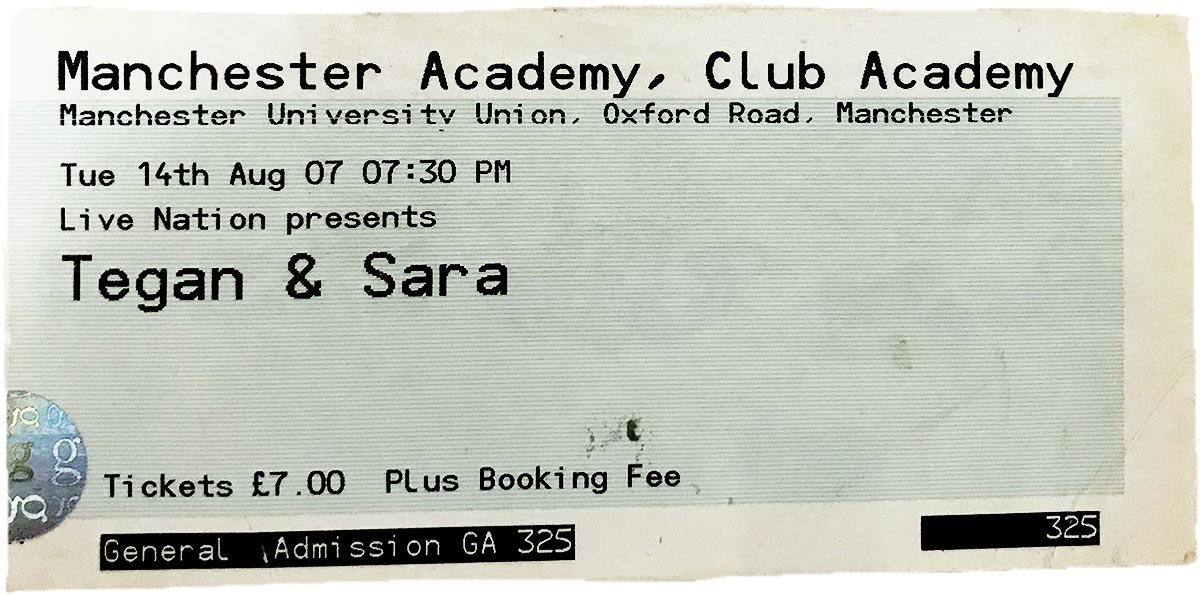
“Each show we played was amazing fun for all of us – thank you to the wonderful exuberant fans of Manchester who had us grinning through the first four songs. My left ear drum suffered greatly though! It rang bells in my head for three days after that show!” — Sara
Clearly we’re ready to go back to high school with Tegan and Sara – if you are too, you can order the book right now! Once you’re done, we wanna hear all your sweetest, most embarrassing and most adorable baby gay high school memories in the comments.
Tegan and Sara’s “High School” Will Fill You With ’90s Nostalgia, Heal Your Teenage Heart
Tegan and Sara’s new teenage memoir, High School, is a mirror. Literally, actually. If you hold up the cover right in front of your face, it will reflect you back at you. Or a distorted version of you. Or multiple versions of you. You if you were looking at your twin. But also, of course, it’s a mirror metaphorically. Because that’s Tegan and Sara‘s whole thing: Their music keenly observes the depths of their own heartbreaks and internalized homophobia, deftly surfs the euphoria of their own crushes and earnest hopes for lasting love, grits its teeth and thrashes back against misogynist critiques that defined their earliest years and albums. But they’re writing about you, too. Your specific break-up and your specific canyon of despair. Your specific frenzy and the exhilaration at simply the thought of that one girl.
What’s stunning about High School — which they’ve released in tandem with their ninth album, Hey, I’m Just Like You, a re-recording and re-imaging of some of the demos they wrote and performed as teens — is that it’s not coy or ambiguous about their high school lives; yet, their experiences still feel universally queer. In High School, Tegan and Sara alternate writing chapters as they navigate their way back through conservative Calgary, Canada in the ’90s. The narrative builds and then brilliantly cuts out right before their careers take off, but their trajectory is anything but smooth. They teach themselves to make music when they find their mom’s boyfriend’s guitar in a closet under the stairs. They learn to write songs; they learn to harmonize; and, as they’re doing it, they’re pushing against and tearing at each other and slamming their bedroom doors so often the boyfriend takes them off their hinges.
But their music is just the backdrop. They both struggle to accept their sexuality, to parse out their internalized homophobia, to come out. Tegan picks fights with relatives when they say homophobic things, without really knowing why it upsets her in such a visceral way. Sara says, “There could be nothing worse than being called a lesbian.” They drink so much they pass out sometimes. They skip school. They experiment with drugs. They argue with their mom, with their teachers, with their friends, and over and over and over with each other. Despite their rising fame, they’re both consumed with loneliness. “In those first few months of high school, I learned to avert my eyes, to show them submission, to be a ghost,” Sara writes. She listens to Mellon Collie And The Infinite Sadness alone in her bedroom and cries.
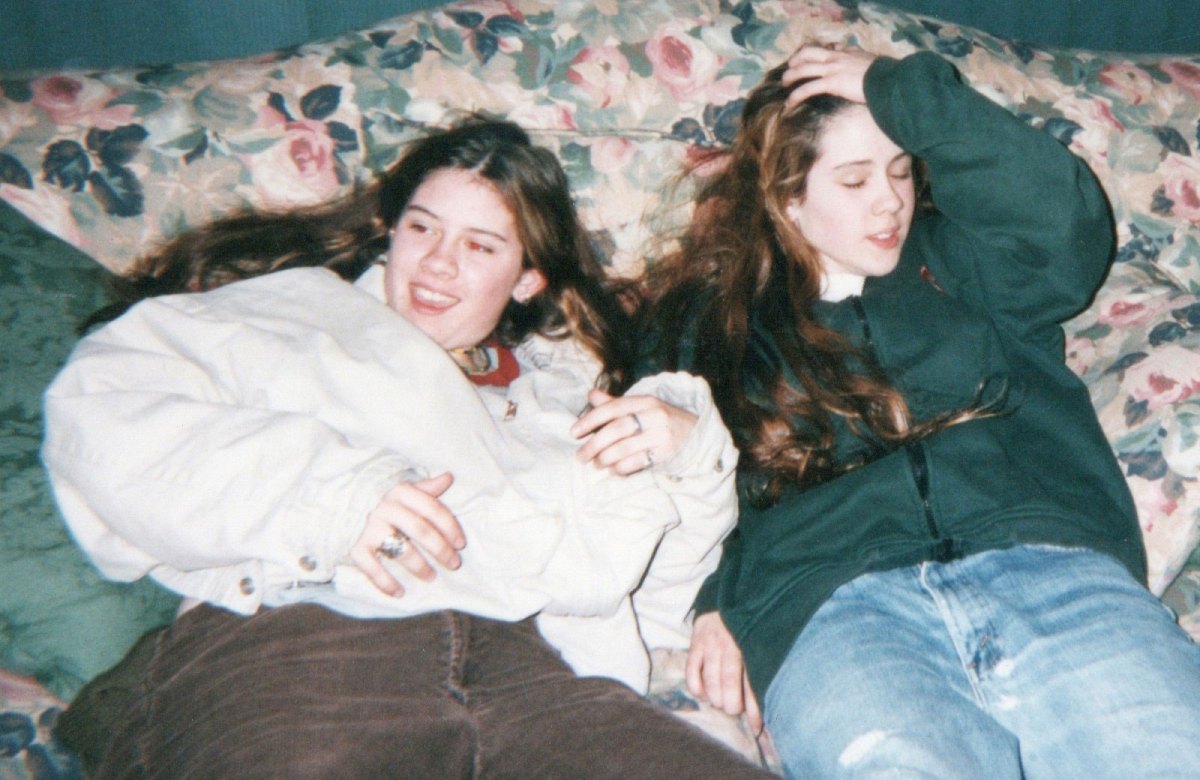
It would sound melodramatic to anyone who hasn’t, you know, been a teenager — but we all have, so it sounds just right.
There’s hope in High School, too. Not just because you and I know a record deal and massive fame and LGBT icon status and world-changing activism is on the way, but because, despite the angst and the arguments and the self-loathing, they both do find their way out of the closet. They both do find their way into the terrifyingly tender embrace of first love. The way they reach back to engage with their younger selves is full of gentleness and affection. Sara told The Guardian that writing the memoir made her realize how much of her shame around desire, and her discomfort with her own body is rooted in her experiences as a teenager. She said she expected to be embarrassed by revisiting her old self, but instead, she ended up loving her.
There’s something extra special about the High School audiobook, and not just because it features the rough cassette recordings of the songs that make up their new album, or because they read their own chapters with their own voices, or because they interview each other for maybe the first time ever. There’s a tenderness in the inflection of their voices when they speak in the present as the people they were in the past. It’s not sentimental. It doesn’t even feel purposeful. It just feels real and ever so soft.
Queer people come of age in perpetuity. We come of age like all humans come of age, with our bodies and brains going berserk in puberty, learning to navigate the world with less and less shelter from the adults in our life. We come of age again when we come out. And again when we start experiencing the kinds of romantic and sexual things our peers experienced in middle school and high school; often as adults. And again when we revisit the traumas we endured as oppressed and marginalized minorities in our youth. Oh, it never ends. There’s a reason queer people well into adulthood flock to TV shows with queer teenage characters; why fandoms for shows like Steven Universe, with its myriad expressions of queerness and gender, are populated by people who aren’t kids; why Tegan and Sara retelling their teenage lives in such a raw and compassionate way feels like Tegan and Sara applying a balm to the retelling of our own stories.
It’s different but exactly the same as the way they were with you when that girl shredded your heart, and that other girl made your body spark to life in a brand new way, and when you were training for that 5K, and when you were driving home for the holidays, and when you were sitting around playing board games with your best friends, and when you were fighting with a girl who was worth the hard work, and when you learned a hard thing about yourself and then learned to forgive yourself too.
“There’s great comfort that comes from traveling through life with a witness,” Tegan writes about Sara in High School. It’s something any of us could have written about either of them.

